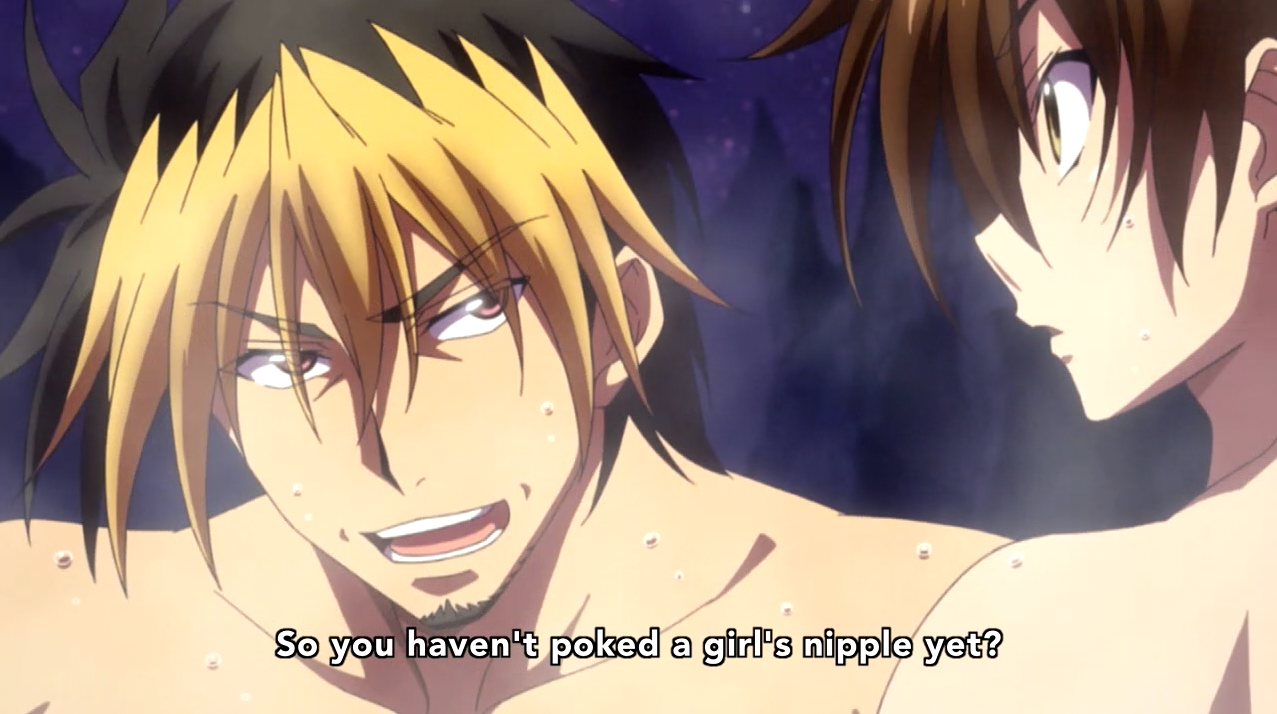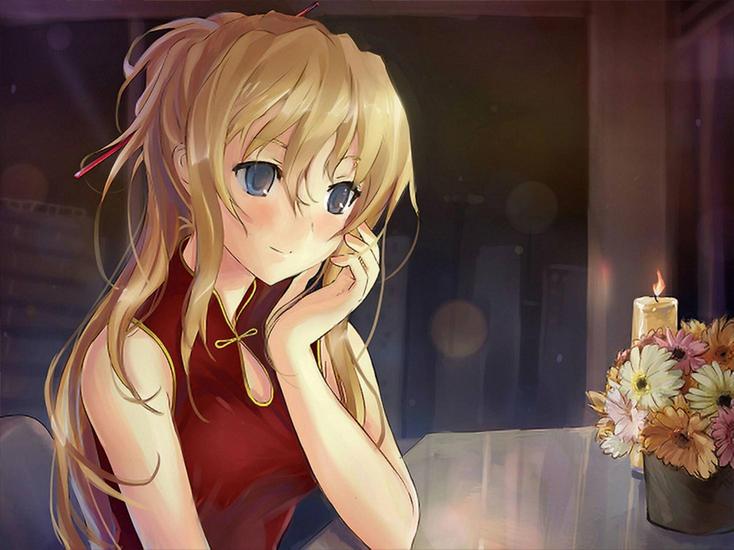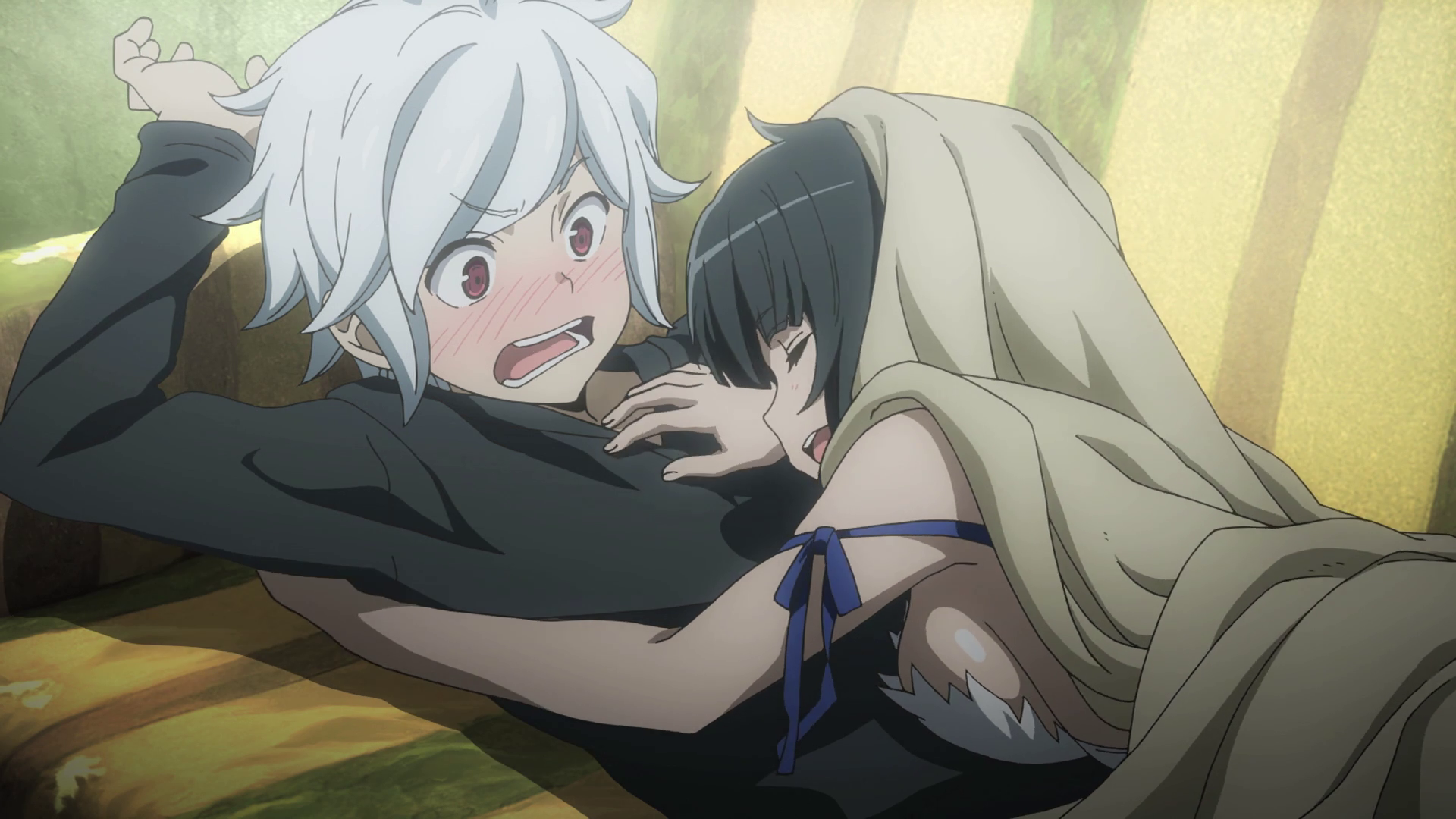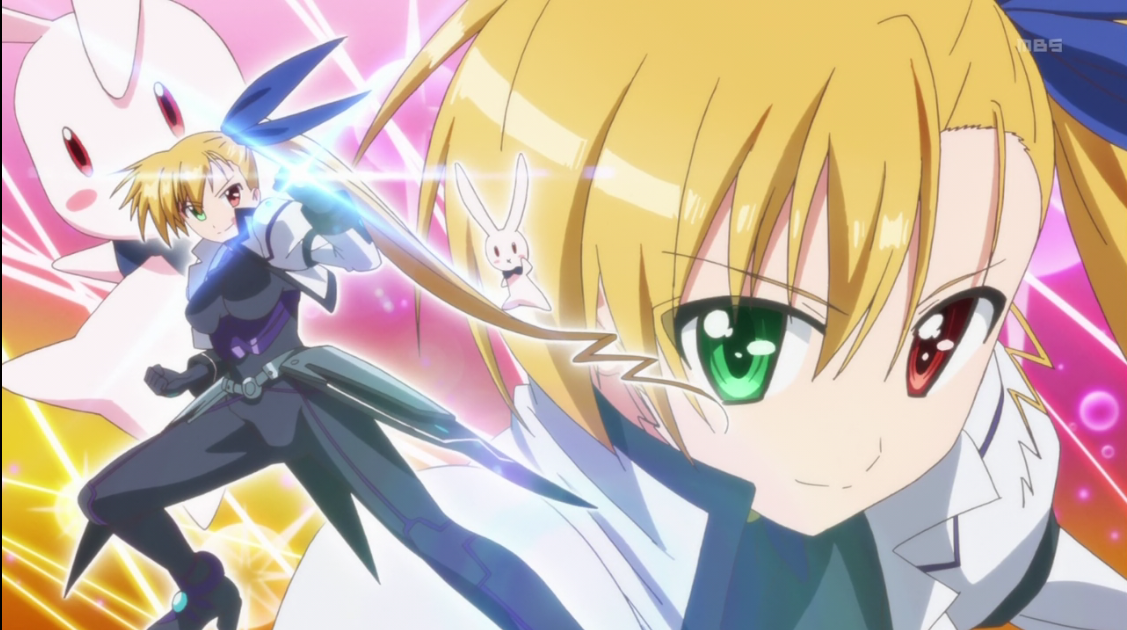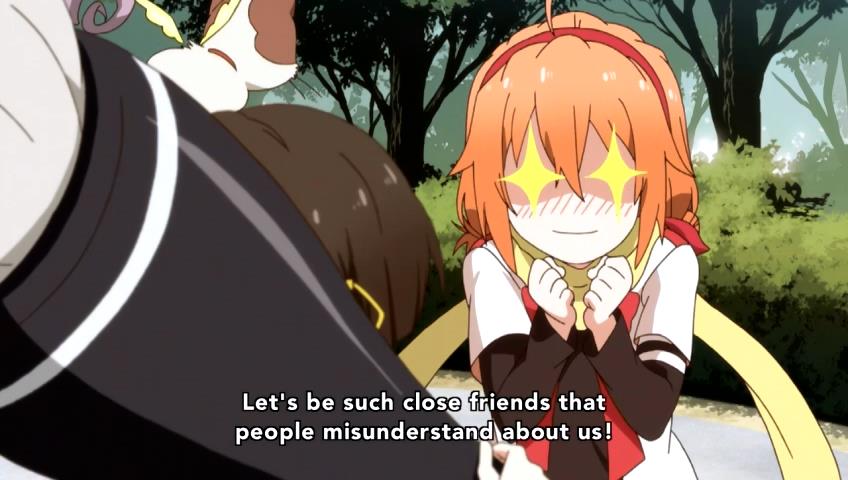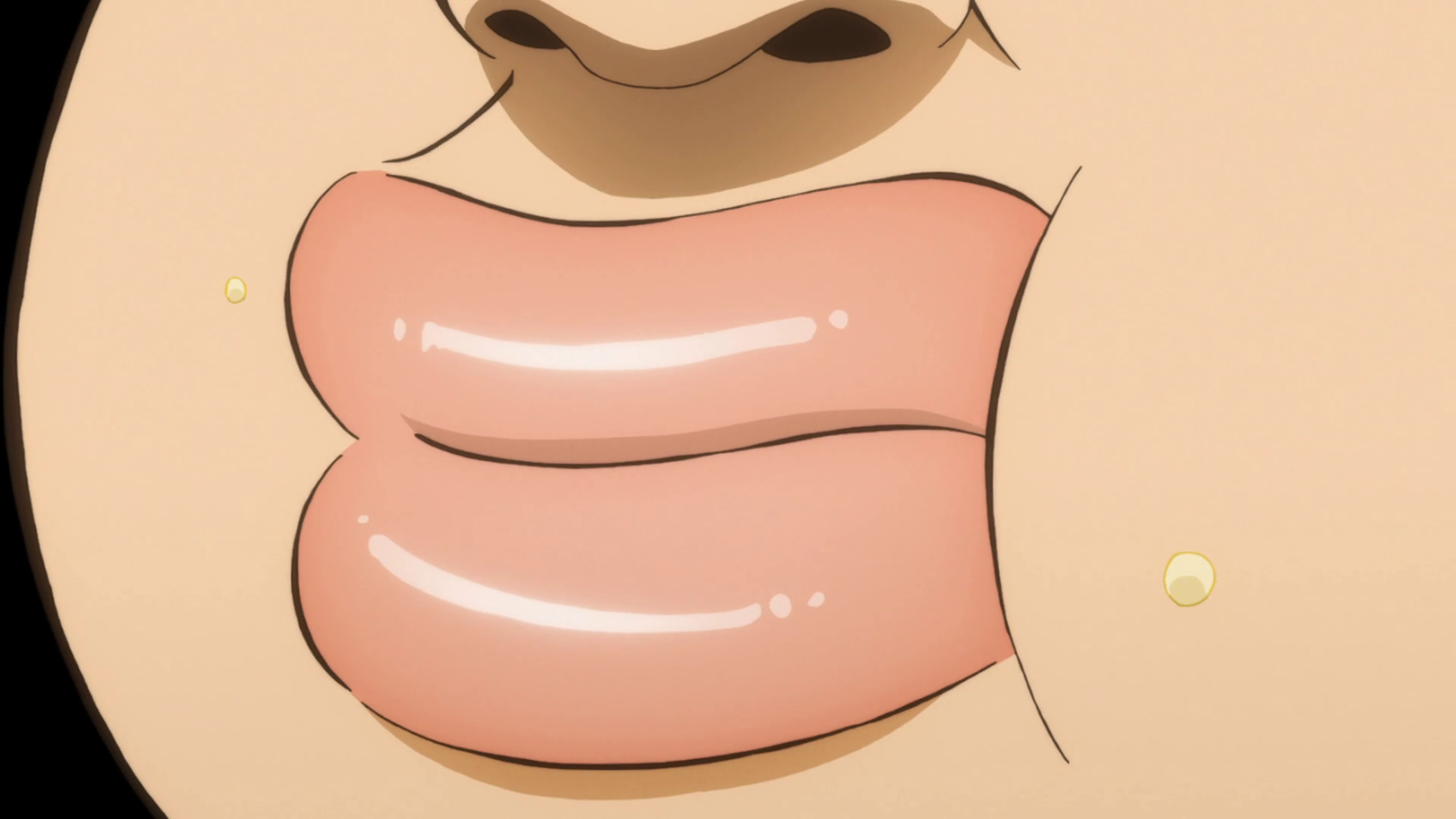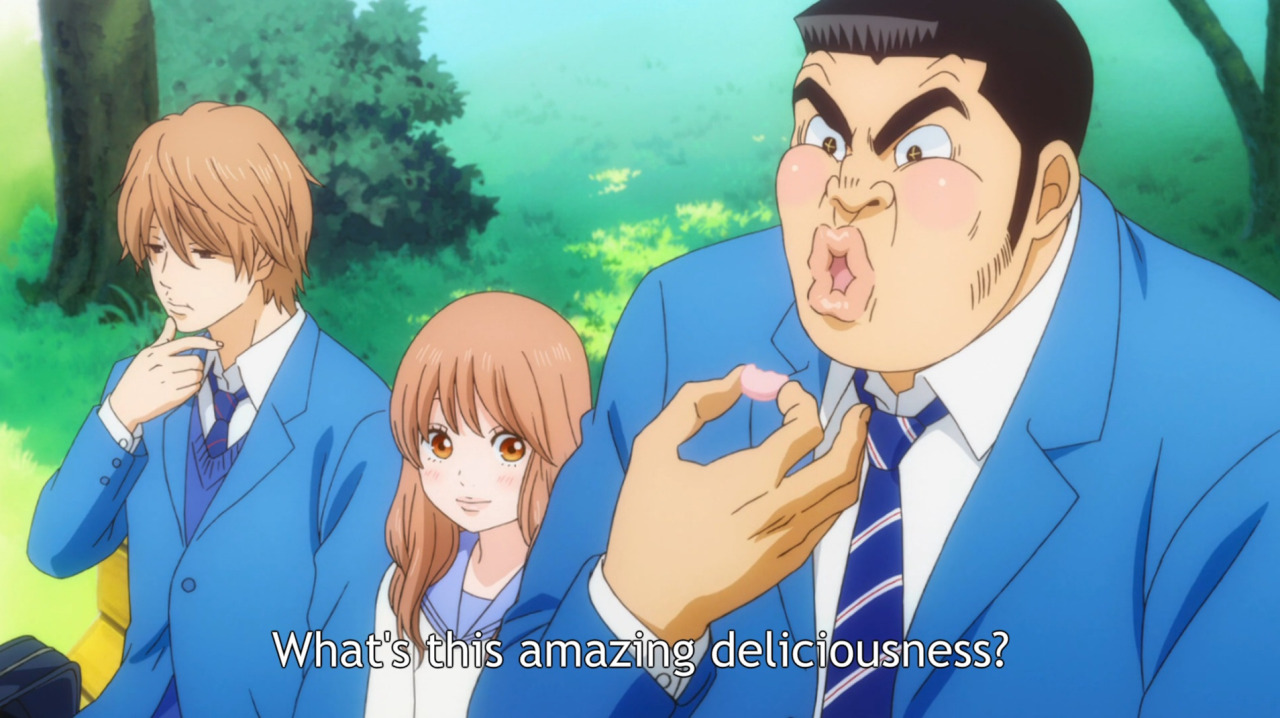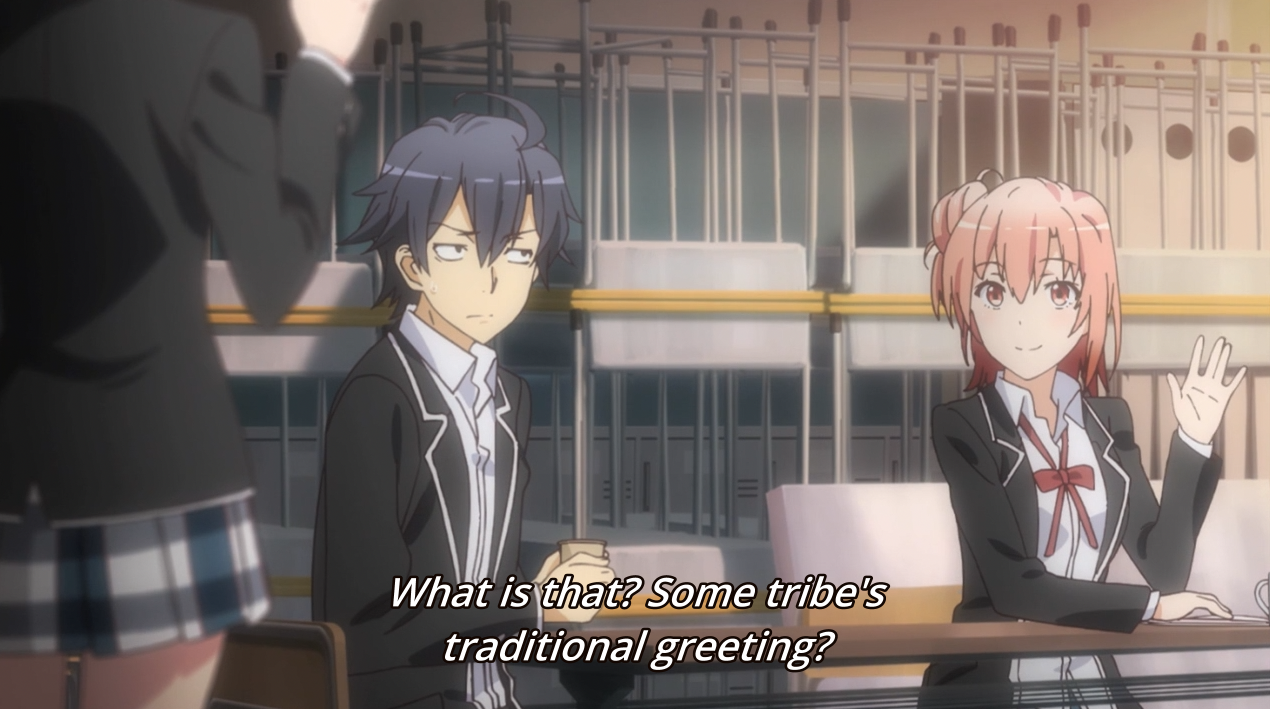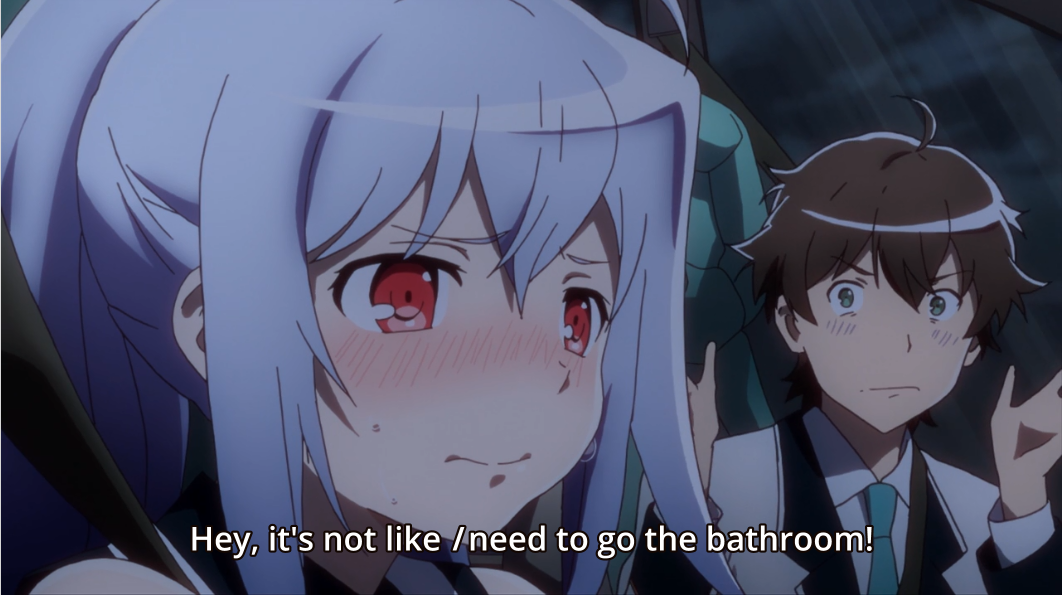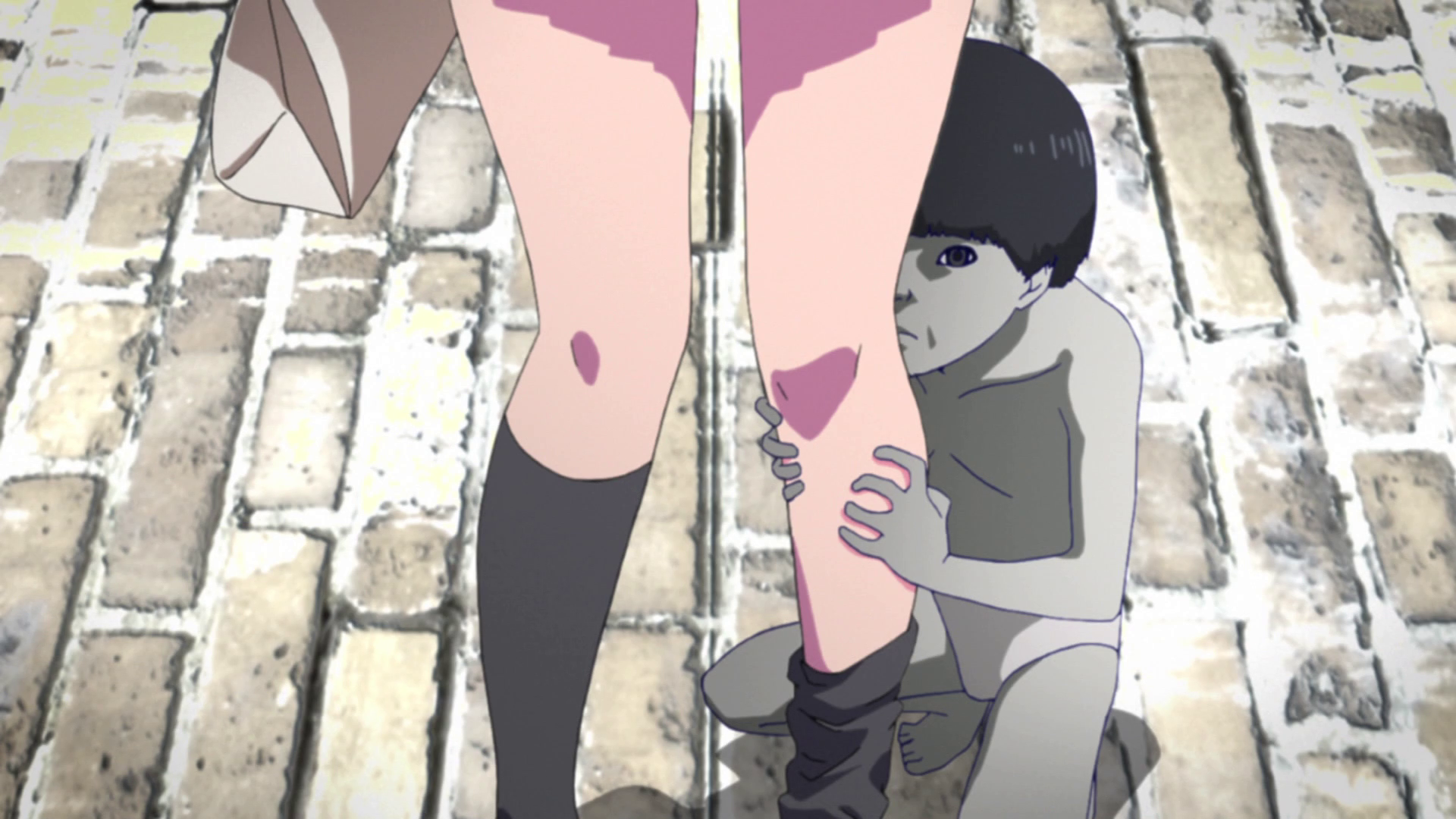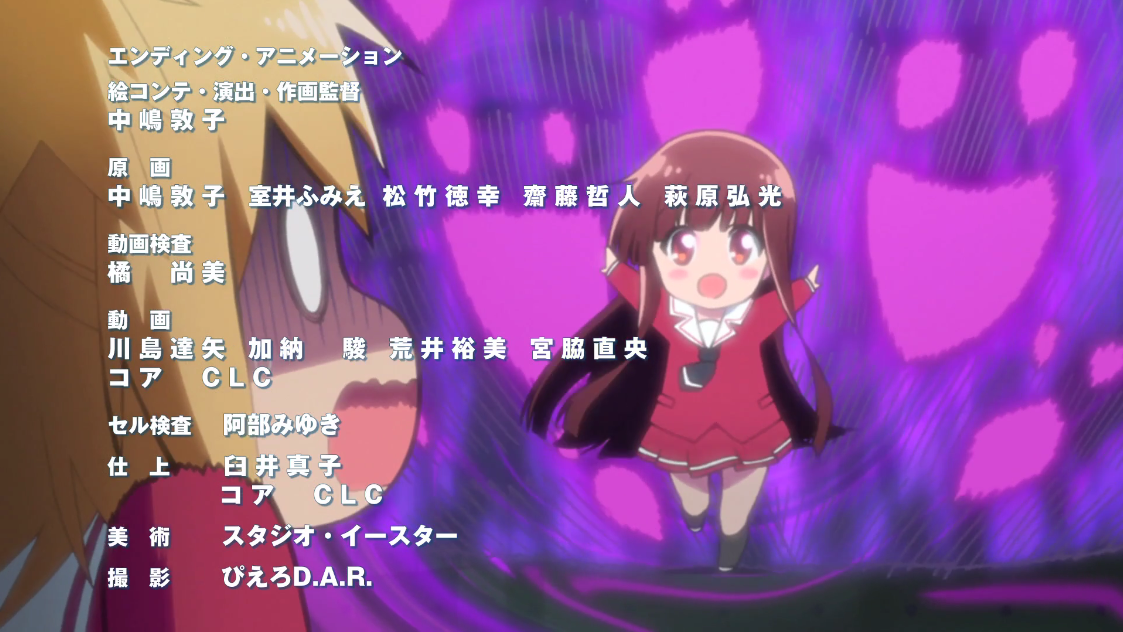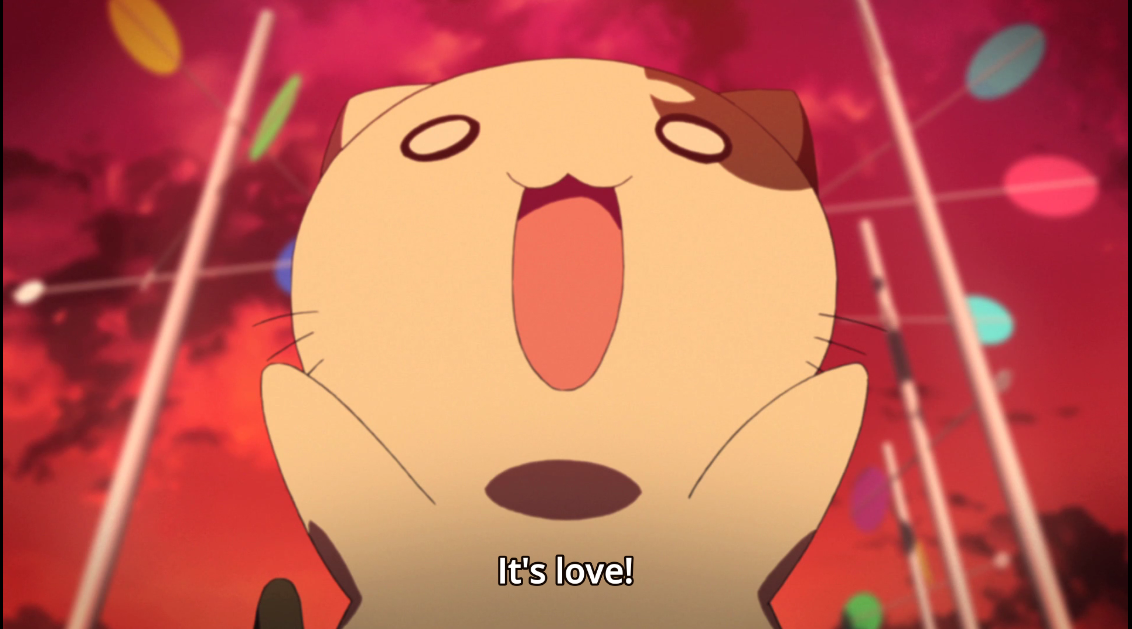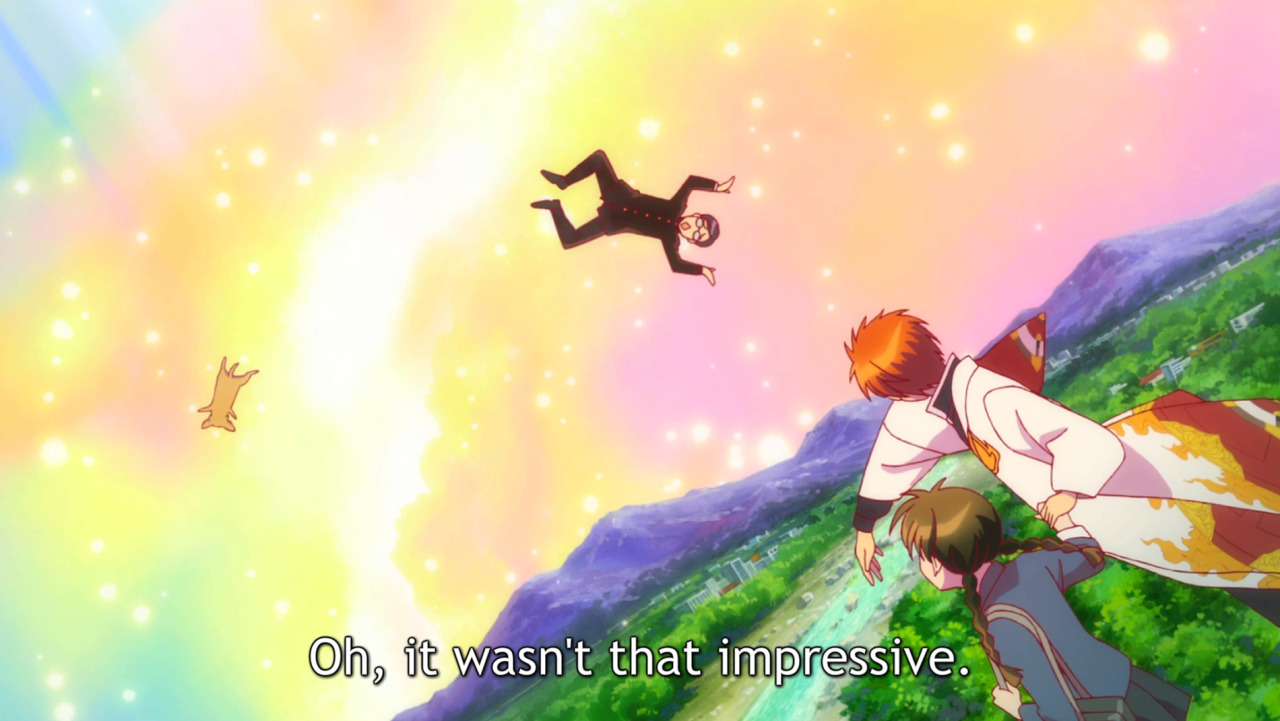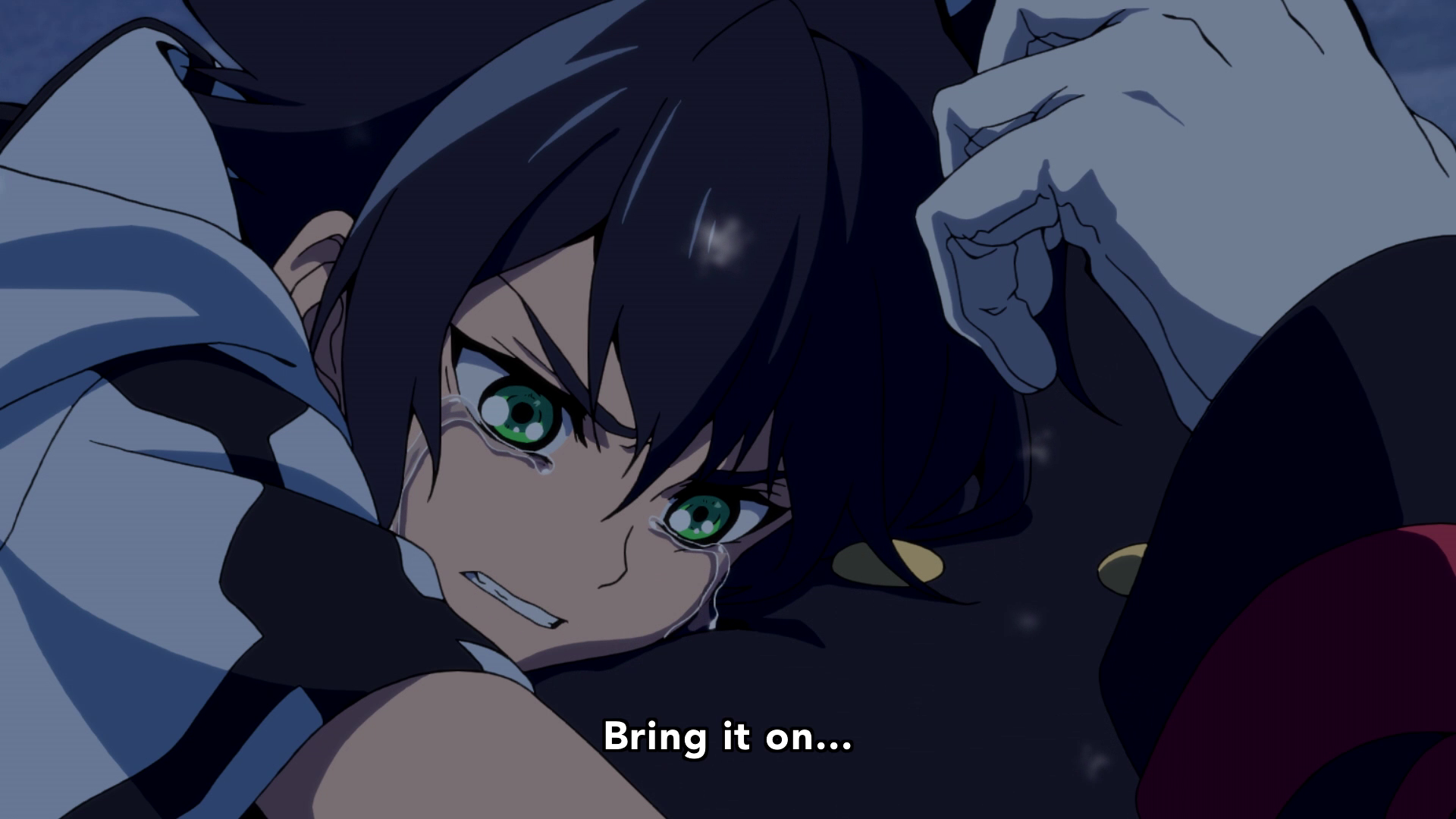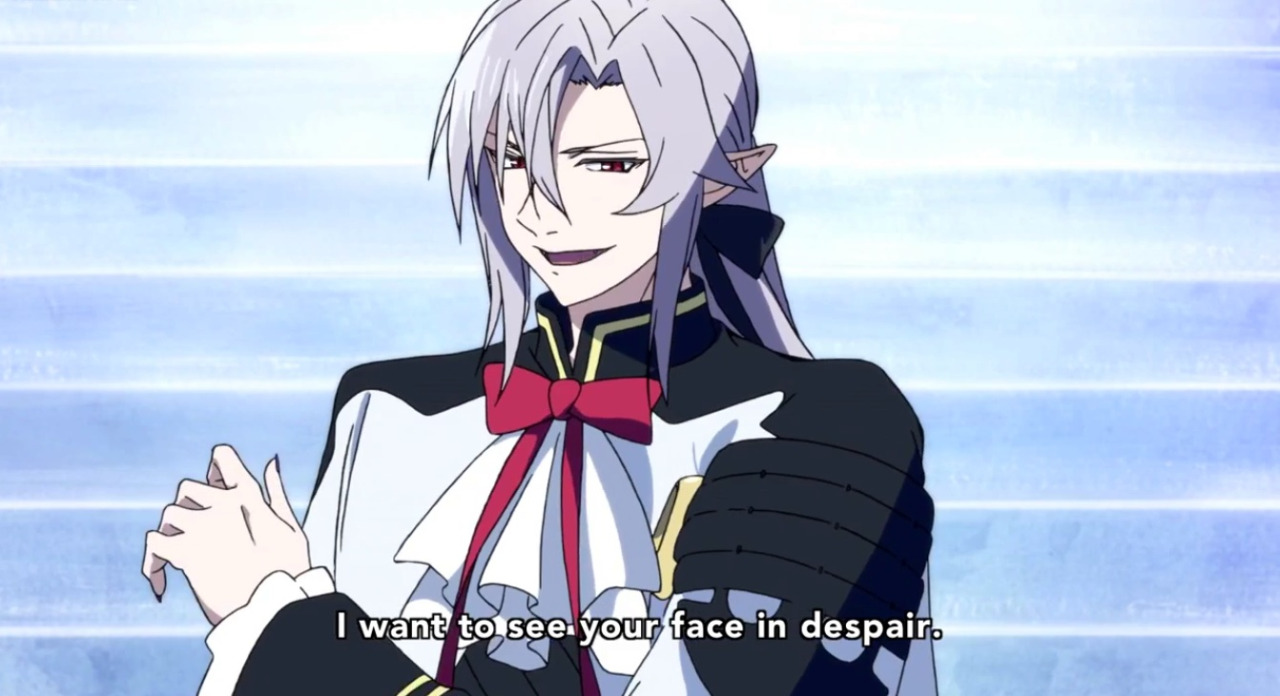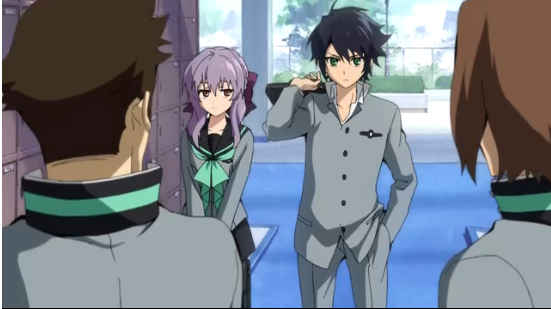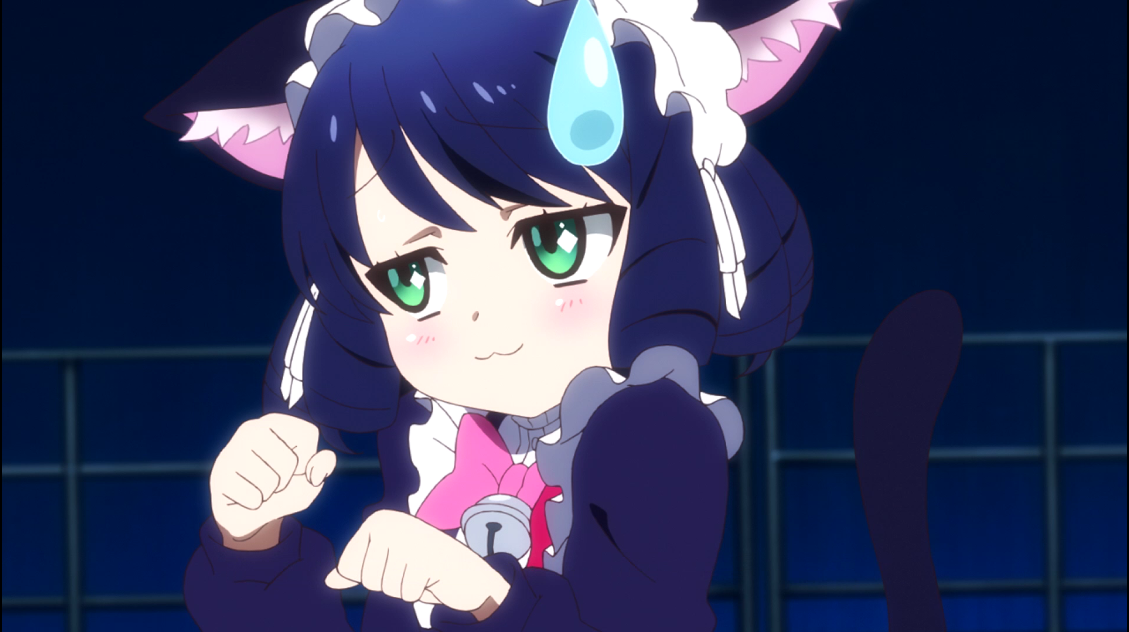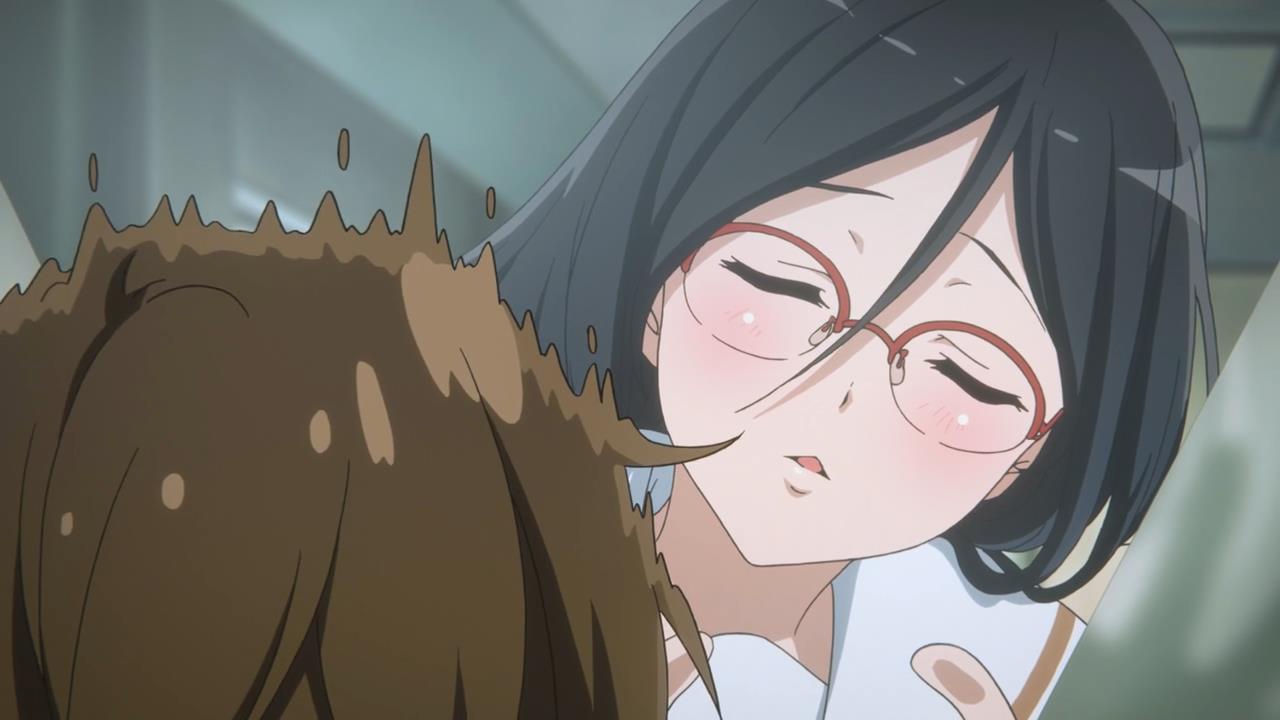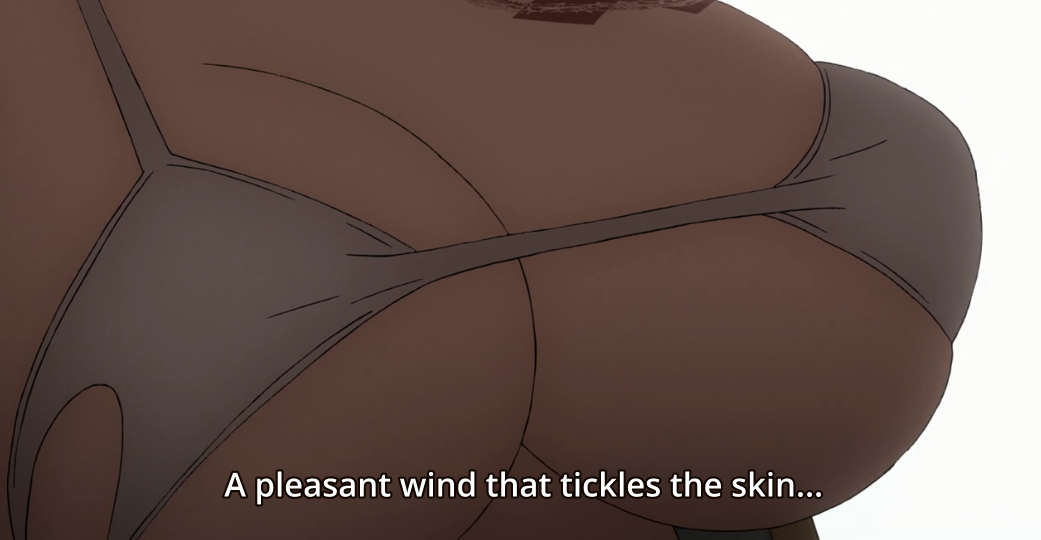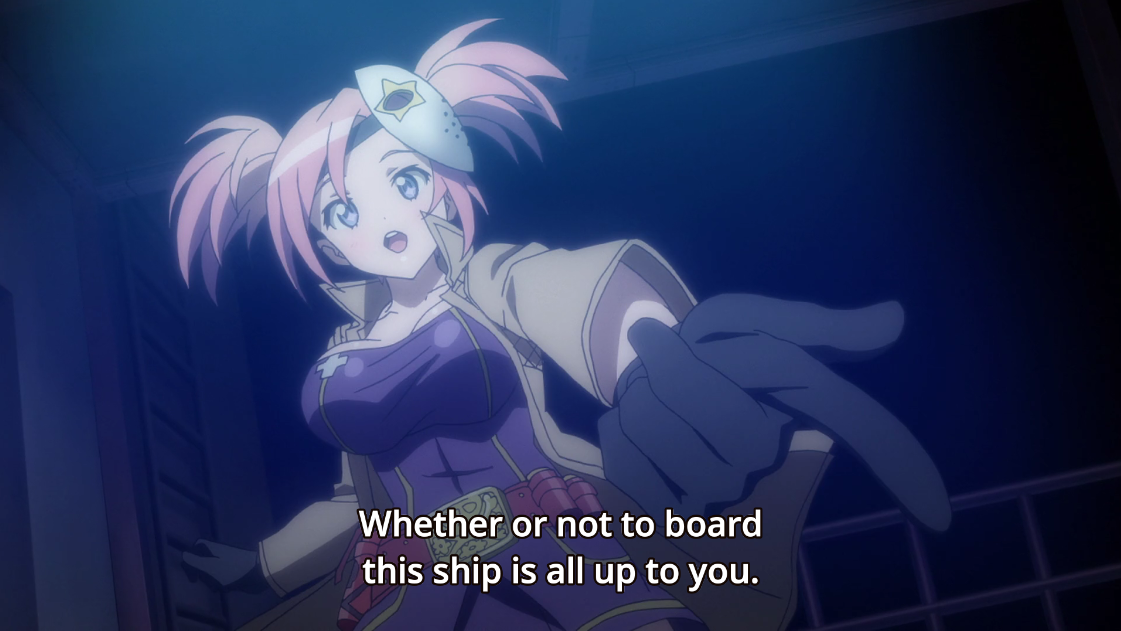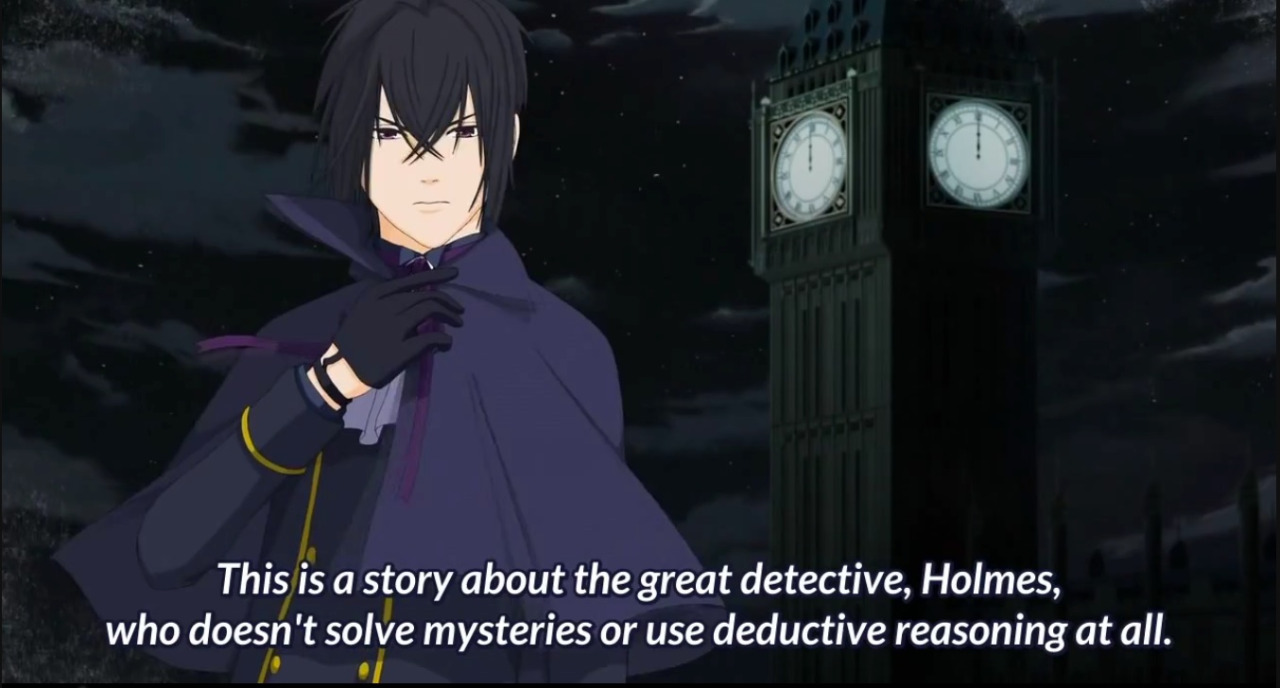04.11
Blood Blockade Battlefront
I really didn’t know what to expect going into BBB. I’m a huge fan of original creator Yasuhiro Nightow’s previous work, Trigun, both the manga and it’s anime adaption, so although I wasn’t aware he made another manga after it until I looked it up after this anime was announced, I was hoping it would be a similarly entertaining series. Bones is a studio that tends to make well-produced, well-animated series, and I consider a lot of their adaptions to be even better experiences compared to their manga counterparts. But while I didn’t doubt the show would look good, I had no clue what the story would be like. Trigun was a very lightning-in-a-bottle kind of series, combining a unique western setting, a fascinating pacifistic yet badass main character, strong morals and themes, and a style of storytelling more similar to american comic books than traditional action manga. I had to wonder if BBB would be able to live up to the example of it’s predecessor. Well, after watching this I’ve got my answer. This isn’t Trigun. It probably won’t come close to telling the kind of story that made Trigun resonate with me and so many other people. But that’s okay. This is still a pretty damn fun show in it’s own right.
Rather than being the spiritual successor of Trigun, this show more closely resembles over-the-top shonen-esque action fare like Kill la Kill. Characters have exaggerated ways of fighting, something chaotic’s always rumbling in the background, and there are explosions glare. It’s a mad, mad world of nonsense and mayhem, populated by various aliens, monsters, and super humans who all co-exist and all are so used to the abnormal that it’s become the new normal. The setting strikes me as Gintama‘s if it was set in modern-day New York instead of an anachronistic Meiji-era Japan, and the fact this series is actually set in alternate version of New York brings to mind Baccano! as well, a comparison helped by the series’ jazzy musical score and action-happy tone. It’s a world of craziness, and while worlds where insanity is the norm might not appeal to most people, it sure does get a kick out of me, and I was instantly drawn in.
It’s really the stylistic flair and the setting that sets this show apart, rather than it having any particularly notable story to bite into, at least as of yet. Don’t get wrong, there is a story set up here, and the characters seem plenty likable and fun, but outside of the MC, most of them worked more as vehicles for the action in this episode, rather than being developed characters with memorable personalities and motivations in their own right. But the episode does present a mystery to why things are how they are, the main character’s desire to find answers about his powers is intriguing, and the chaos-driven villains featured here seem like they’ll create some fun conflicts down the line, so I can easily see the story becoming more fleshed out and substantial going forward. In addition, Nightow’s flair for great character designs has carried over into this show very well. The characters’ personalities might not be anything too special, but they certainly all look unique and cool, and that distinctiveness helps sets this show apart from the more generic-looking fare that come out these days.
If there’s one thing I didn’t care for in the premiere, it’s how the MC’s narration was overused. I have a feeling that this won’t be much of a problem in the future, since it’s purpose in this episode was to effectively describe the setting, the MC’s relationship to the setting, and his personal motivations, but it did start to get on my nerves after a certain point. But otherwise, I think the show succeeded in being what it establishing what it is, and will likely continue to be. This is very much a popcorn action show. I’m sure characters will get fleshed out and developed going forward, but the main appeal of the show seems like it’s going to be in it’s setting and it’s action sequences. While the story will no doubt become more meaty to convince viewers into sticking around for more, this is a series that, at the end of the day, is something that will just be remembered as a fun show rather than a substantial one. But I don’t think there’s anything wrong with that. This is an entertaining show, and it’s entertaining for the right reasons. And while there’s plenty of spectacle, unlike certain other shows, it’s actually does have interesting, or at least distinct, characters that can support those moments and make them engaging. Knowing the mangaka’s previous work, I feel that the series has the potential to become something more than what it appears to be on the surface, but if it only remains a hot-blooded shonen action show, than at least it’ll be a damn well-made and entertaining one. Either way, Blood Blockade Battlefront promises to be a bloody good time, and right now that’s all it needs to be. — Cartoon X
The Disappearance of Nagato Yuki-Chan
Remember that Haruhi Suzumiya everyone talked about eight years ago? Oh wait, you don’t. You only remember Yuki Nagato, and possibly Kyon. You might also remember that one girl with the knife. She was a thing, right? And the girl who said “Nyoro~n” a lot? Yeah, she existed too. There was also that girl who kept getting groped every episode. And they were all in a club. That was neat. Don’t know what exactly the club was about though, so I’m just going to think it was a literature club. I remember some books in the old show. Do you remember books in the old show, because I sort of do. One of them was a fantasy book called Hyperion, but I don’t remember Yuki reading that. I remember her playing a PSP, because that’s the best book.
God, I’m not even a Haruhi fan, and should probably be thankful this isn’t another Prisma Illya, but there’s something about this show that didn’t settle with me. Maybe it’s how Kyon is nowhere near as caustic as he was in the main series. Perhaps it’s due to the lack of fantastical elements hiding between the lines. Or could it be that the show tries to ape the style of its predecessor but with what only appears to be a third of Kyoto Animation’s budget? Despite the marketing, this show doesn’t feel like it’s made for the people interested in the alternate world from the Disappearance film, but rather people who thought Endless Eight was exhilarating. The kind of audience who willingly watched that arc will be delighted as the “Yuki tries to buy a turkey for the Christmas party” plot unfolds in front of them.
I remember that Haruhi Suzumiya’s appeal was through playing with the otaku fantasy, like how what Haruhi wanted all along was in front of her but not in the way she expected. Characters that were initially presented by their cover were revealed to be something else, like how the pretty boy turns out to be a psychic or how the endowed chewtoy is a time traveler. These reveals created the theme that the fantastic hid itself within the mundane and vice-versa. I know the “What you wanted was right in front of you” idea isn’t profound or uncommon in fiction, but the series was able to make it feel somewhat fresh. Here, however, this just straight up feels like an otaku fantasy. It doesn’t want to ask questions, being more satisfied with in-jokes and Yuki talking about her belly.
And yeah, I know spin-off works usually have this sort of thing, but what I’m really wondering is why this was chosen to bring the franchise back on TV after five years. That’s kind of like if the infamous Full Metal Panic sequel everyone’s been craving for turned out to be a watered-down Fumoffu. It’s almost sad to see what used to be talked by everyone now struggling to get a slice-of-life AU into this season. Was there just not any demand for an adaptation of one of the books that they had to go with this? It feels like the one kid who used to be really popular now trying and failing to get noticed in background pictures. — Bloody Marquis
Second Opinion!
Wow. I was starting to think it would never happen. But it has. It has! It took over five years, but they’ve finally done it dagnabbit! That’s right folks, after all this time, they’ve finally made a new season of The Melancholy of Haru—ah, wait a minute, I think VlordGTZ is calling me about something. Hang on a sec, I gotta take this – I’ll just transcribe my side of the conversation: Yo, wassup, bro? What? You’re saying this anime is just some spinoff thing about Nagato? And not even Nagato from the original series, but the Nagato from the alternate universe in the Disappearance film? You mean to tell me that it’s about the Nagato who acted like your standard insecure and shy cliche anime girl and not the mysterious stoic badass of the original? Well, that’s kind of lame. They really thought she was somehow interesting enough character to center a whole series on? Wait a minute, what about Haruhi? She’s still in this, right? What? You’re telling me she’s only in this episode for like a 20 second non-speaking cameo? The scene is basically a total tease? And show itself is just a run-of-the-mill school comedy with a romance subplot revolving around Nagato trying to confess her feelings to Kyon? …Huh. Are we sure this isn’t just some unusually well-produced fan-animation? No? This is a legit series? This is adapted from a manga? A manga that’s still currently-running, even? Wow. Anime fans, man. They’ll just eat up anything, won’t they?
Okay, okay, all kidding aside let’s get legitimately evaluate the merits of this thing, shall we? Apparently The Disappearance of Haruhi Suzumiya was so well-received…or more specifically, the alternate version of the Haruhi universe and characters as depicted in that story arc were so popular, that they decided to make an entire manga set in it. This isn’t a continuation of the series, but rather a separate story unrelated to the main storyline of the Haruhi franchise. It’s basically the equivalent of making the school-comedy alternate universe depicted in the last episode of Evangelion it’s own series….which is also an actual manga series that exists, for some reason. In any case, there’s no ignoring that the manga this anime is based on was just a cash-in spinoff designed to milk the franchise and exploit it’s money-throwing fans for all it’s worth, and the reason this anime has even been made is basically to promote it as it’s finally winding down. As well as maybe trying to make the Haruhi franchise relevant again. Maybe. While that’s all fine and dandy, is this series actually good, or is it just another terrible cash-grab trying to trick die-hard fans of the franchise into wasting minutes of their life and wads of their cash?
I’ll admit, the Haruhi franchise as a whole has been rather hit and miss for me. I liked the first season, but hardly considered it phenomenal or worthy of the hype (love the OP and ED, though). I thought the second season totally sucked, even outside of the infamously pointless “Endless Eight” bullshit. I loved the Disappearance film, and to this day it’s among my favorite anime movies. And I quite enjoyed Haruhi-chan, an amusing chibi-spin off series that is one of the few self-parody comedy spin-off series that I think is genuinely good. I’m ambivalent on the manga version of Haruhi, and in fact, also read a few volumes of the Nagato Yuki-chan manga a few years back (and even own a couple volumes). So I remembered most everything that happened in the premiere episode being from the first few chapters of the manga, enough to get the sense that this will be a pretty straightforward adaption of it. In this case, that might not be such a bad thing. Because despite the fact this is a pointless cash-grab made to milk the Haruhi franchise for whatever it’s got left, on it’s own merits this series is actually surprisingly enjoyable.
You kind of have to judge this series on it’s own merits, though. Honestly, the fact that these look like the characters we all know and might love is really all the relevance this even has to the original series. The characters are recognizable but not quite the same; they don’t have the same problems or quite the same character dynamics, much less the same powers and secrets, that they have in the original series. And while the majority of the characters do still act like themselves most of the time, if you’re a fan of the original Nagato as a character, you’re kinda SOL. She might look like her, and she might share her name, but the Nagato Yuki in this series really is a completely different person altogether, and you’re mileage might vary on that depending how much you liked the original character for who she was and how she behaved.
Then again, the selling point of this series is really in just watching the antics of the Disappearance universe’s Nagato for the novelty of how different of a character she is from the original, as well as seeing the rest of characters doing things and getting into situations they normally wouldn’t. If you’re going into this series expecting more of what you got in Haruhi, quite frankly I think you’ll be disappointed. This is more of a parody of the original with humor in the same vein as Haruhi-chan, except with regular character designs and a more grounded tone. And as someone who likes Haruhi-chan more than the actual series, a lot of the comedy in this did work for me. I don’t find Nagato acting like a shy and socially awkward moe-girl funny in of itself, but the concept is used to elicit some fun quirks, absurd situations, and nice character-based gags that make this version of the character likable when she could easily have been obnoxiously saccharine. Asakura and Tsuruya are also great in this (as they were in Haruhi-chan), and every bit they’re given works, with the best sequence of the episode coming when they try to have their respective BFF’s Nagato and Mikuru compete to see which one is “worthy of Kyon’s love,” but then get involved themselves and just end up competing against each other in random pointless contests half-way through. It’s like something out of a Rumiko Takahashi manga (actually, it totally is), and it’s genuinely funny. Even if these weren’t the Haruhi characters doing these shenanigans, this sequence would be still be just as humorous, which is a good sign that this series will be able to work on it’s own merits, and won’t just lean on how much you might like the original series in order to make you want to watch more of it.
The Disappearance of Nagato Yuki-chan may disappoint Haruhi fans who really want to see the rest of the light novels animated, and it’s appeal is fairly limited, with people who have no interest in the franchise unlikely to give it a try. But, if you like the franchise even a smidgen, even on just the most casual level you can, you’ll find a pretty entertaining show here. And I’m not going to lie, I found myself shouting out “Haruhi!” in excitement when she passes by Nagato at the intersection, and cracking a smile at Asakura humming “Hare Hare Yukai,” and I’m not even that big a fan of the franchise. The whole show is like glorified fan-service for people who like Haruhi (you know what I mean), but it’s presented well, with great animation, staging, shots, and music that show there’s not only a budget but also that the people working on this do actually give-a-damn about it. In what’s been shaping up to be a disappointing season on the whole, it might be the best sign of things that one of the better offerings to come out of it is a frivolous spin-off of a franchise long out of the limelight. Still, it’s a well-made little show, one that anyone who ever liked Haruhi should get some enjoyment out of, and it made me think back to the day I first checked out the series and all the positive memories I’ve associated with it over the years. So, what the hell? I’ll take it. And unless you really hate the franchise on the whole, I recommend you giving it a whirl too. Just don’t expect it to lead to a new continuation of the original series anytime soon. — Cartoon X
Third Opinion!
Back when The Melancholy of Haruhi Suzumiya was hailed as the next wave of anime perfection and served as a catalyst for the continued adaptation of light novels into television animation, Yuki Nagato was one of my favourite characters in anime. Yuki was an artificial human created by an alien race as old as the universe itself. The character was so stoic and non-comprehending of our species’ social norms and behaviors that every bit of screentime she had was just interesting to behold, just to see what deadpan reaction she’d give to the antics around her. She was also the only character who always laid all her cards on the table in regards to Kyon, and thus felt like the only one that truly had his back in any situation and wouldn’t dare betray him. And when The Disappearance of Haruhi Suzumiya came along, we learn that Kyon has her back as well. That friendship between a alien entity and average human is the most interesting character dynamic of the franchise, surpassing Haruhi and Kyon’s in my eyes.
So you’d think that a show that is just Yuki and Kyon hanging out and doing best friend/couple things would be fun. But there’s one problem: this isn’t that near-emotionless Yuki. This is the painfully shy girl from the alternate universe in the aforementioned Disappearance. And that’s where this cartoon falls flat on its face. Instead of seeing two people from completely different worlds start to appreciate and depend one another in a world subconsciously ruled by a psychopathic teenager, we now have your standard J-drama where a socially-awkward girl tries to confess her love to a guy that probably feels the same way. This Yuki isn’t the one that rewrote the entire code of a multiplayer video game on the fly during a LAN match. This is one that really, really wants to buy a turkey for Christmas. This isn’t the Yuki that can take a dozen steel rods straight through the torso with barely a flinch. This is a Yuki that freaks out if Kyon so much as grazes her skin. For a spin-off starring one of my favourite characters of the original work, I’m struggling to find anything of that character in this high-schooler of the same name. And even in the few moments where you can see shades of other characters channeling their main timeline counterparts, that fact remains disappointing. As someone who was able to handle and enjoy the monotony of Endless Eight, I had to force myself through in hopes of seeing the Yuki I once adored anywhere in the program. 24 hours later, and I’m still wondering where that glorious creation of the Data Integration Thought Entity disappeared to. Because it isn’t here. — RacattackForce
Etotama
I have nyo idea what I just witnessed, but it was certnyanly nyat anything resembling “good.” Between the obnyaxious characters, uncomfortable dialogue, horrifying CGI, and soul-sucking OP, I was physically incapable of sitting through the entire episode. It’s wretched. Painful. Sickening. Just try to watch this shit for yourself if you think I’m overreacting. Better yet, don’t. — Foggle
Fate/stay night: Unlimited Blade Works, Season 2
I think everyone can agree the season finale to the 1st season of Unlimited Blade Works tasted like ass, or was very disappointing, to put it in finer words. The animation was off, the pacing was a bit shit, and it felt overly unnecessary, like ufotable was deliberately trying to create some weird love triangle between Rin, Shirou and Saber.
We all know Rin is the best anyway, so there’s no competition.
Anyway, it’s been three months since we’ve had Fate in our lives and our defenseless anuses, so it is refreshing to have a good show in a decent season. From the opening scene onwards, it is apparent Fate is back to the excellent form it showcased all last season (excluding the finale). Archer is still a dick, Shirou is still dumb-cute, Saber is the poor man’s best girl and does nothing in this episode except being tied up, Caster and Kuzuki are menacing and Rin just rules over everything. I am a very bad woman when it comes to Fate, because I can barely have a bad thing to say about it.
I’m so boring. I loved this episode. It was a return to form that Ufotable has become famous for since 2011’s Fate/Zero – excellent animation, solid plotting and pacing, good music. I have nothing else. I’m a boring shit, I know. Oopsie. – ShiMahou
Food Wars! Shokugeki no Soma
One day, an upstart mangaka named Yuto Tsukuda got the brilliant idea to make a manga that combined ridiculously over the top cooking with ridiculously over the top sexual situations. I mean, come on, food and sex, everybody loves those, so why not make a manga that mixes the best of both? And so, hiring an infamous ex-hentai artist to draw his luscious loafs and meat, he set out to get his ingenious creation published in the #1 manga magazine in all of Japan, the self-proclaimed home of “the world’s greatest manga,” Weekly Shonen Jump. And thus Shokgeki no Soma (also referred to as Food Wars! in the west) was born, a series that can quite literally be described as Food Porn, the manga. At least, that’s everyone’s first impression of the series. But while the over the top orgasmic reactions to food are an integral part of the fun and identity of Food Wars!, they aren’t all there is to the series, and those who were drawn in by that silly gimmick in it’s first chapters quickly realized this. And, while these foodgasms (as I like to call them) never disappear, the series doesn’t rely on them, and finds other novel ways to inject humor and demonstrate the deliciousness of the food and the intensity of the cooking competitions. Outside of one female character who never wears a shirt (which, to be fair, is balanced out by a male character who wears nothing but an apron), there is very little in the way of fan service outside of those scenes. The series actually avoids the most obvious anime cliches that serve to include fan service. It’s never over-exposed and never gets in the way of the story, and when it does happen, it’s designed as a means to best convey the characters’ extreme enjoyment of their food – which serves to the benefit of the story and are not just random extraneous scenes simply exploiting the female body. It’s purposeful, tasteful, equal opportunity, and all in good fun.
…This anime adaption, on the other hand, is a completely different story. I guess J.C. Staff thought to themselves “hey, this series is known for it’s crazy fan service, so let’s add more of it!”, resulting in this embarrassment to good taste (pun intended), and the original manga. And they didn’t just add in lots more boobage, no, they’ve made the fan service moments actually kind of creepy too. Namely that tentacle scene, which is thirty seconds of octopus tentacles slowly grabbing and suggestively squeezing the body of a young girl, with one shot featuring two tentacles shooting into her crotch area and spurting out some gooey yellow glop while the girl screams in a horrified, yet somewhat sexual, tone of voice.
…Why? Seriously, why J.C. Staff? Was the idea of a prepubescent teenage girl getting violated and possibly raped by icky slimy tentacles supposed to be funny? Because it’s not. It’s sick and it’s disturbing. The fact it’s played for laughs, and possibly to titillate, is just insulting. It’s only a thirty second sequence, but it pisses me off the more I think about it. For the record, very little of that was in the manga. All that’s in the manga is that last image of the girl and the octopus, and that image was far more tasteful and effectively amusing than the anime’s version even ignoring the preceding scenes. You know what else isn’t in the manga? Constant boob shots. All throughout this episode, any scene with the female lawyer always had the camera centered straight on her gratuitous cleavage-bearing chest, with some notable jiggling thrown in for good measure. This was done in every single scene she was featured in. The anime really wanted you to pay attention to just how big and bouncy her breasts were, I guess. It’s not just pointless, it’s downright distracting. It sucks you right out of what’s going on in the show and becomes all you can think about. It’s like the anime cares more about you looking at her breasts than anything that’s actually going on in the show. It’s not funny, and never does it feel like you are supposed to find it funny. It’s in-your-face there and it’s annoying as all hell.
The focus on the fan service in this anime is so overdone, and played so straight, it doesn’t come across even remotely amusing like it originally was in the manga, and instead feels like a forced attempt to appeal to the most lowbrow of tastes. For people who have a low tolerance for this kind of fan service, like myself, these scenes come off as uncomfortable and unpleasant. I was eating dinner while watching this episode, but by the time I finished, I had completely lost my appetite. The fact that the fan-service is such a detriment to the episode is such a shame, as is how nothing else in the episode makes up for it. The show is plenty over the top, sure, but it doesn’t really carry an over the top tone. There’s no epic music, fast action cuts, ridiculous dialogue, exaggerated animation, or stylistic quirks like in, say, JoJo’s Bizarre Adventure, that pushes the series over the edge and gives it an enticing manic energy. Instead, it all feels very slow, very grounded, and surprisingly serious, for the most part. Yet, at the same time, the show extends the over-the-top moments, like the climactic foodgasm scene, for much longer periods of time. That aforementioned scene was only one two-page spread in the manga, but the anime drags it out for a full minute, adding extra tit and ass shots and lots more weird disgustingly sexualized WTF-ery. And because the rest of the episode doesn’t carry the same tone as that scene, nor effectively build it up, it’s just not very entertaining. Instead of going “WTF is going on?” while laughing yourself silly, you’re saying it while being bored out of your mind, and following up with a “Why am I even watching this shit?” once it ends.
I think this anime is a sign that I should stop getting excited for any anime adaptions of manga that I really like. In most of the last few Clusterfuck entries I’ve done, I’ve found myself talking about how disappointing I found the anime adaptions compared to their original mangas. Shokugeki no Soma has to be the worst one yet, though. Unlike Assassination Classroom or The Seven Deadly Sins, which were manga I didn’t care for much in their initial chapters to begin with, I was into the Shokugeki no Soma manga almost right off the bat. I was enjoying and having fun with the series pretty much from the get-go. But this episode isn’t fun at all. It was at boring at it’s best, irritating at it’s worst, but never was it fun to watch. The misguided execution of the production makes little in the series stand out as interesting or entertaining, leaving me to mostly remember and focus on how terrible the fan service moments were executed. The show is certainly nice-looking, the food looks pretty good, and the animation does the job, but in terms of taking the essence of the source manga and translating it effectively into animated form, it falls totally flat. And considering Soma is one of my most favorite ongoing manga right now, I can’t help but be extremely disappointed about that. J.C. Staff hasn’t made an anime I’ve been remotely interested in since…Slayers Evolution-R, I guess, and while I heard they’ve gone downhill in recent years and their adaption of a similar in tone Jump manga, Bakuman, was extremely subpar, the promos for the anime made it look like it would be a solid product. After watching this first episode, though, I think I can understand why the studio is as maligned as it is these days. Like their Bakuman adaption, they seem to have fundamentally missed what people enjoy about the Soma manga in the first place, and why they love it too. I don’t know what studio could have adapted this series more properly, but I do know that it really deserved much better than the treatment J.C. Staff has given it.
The Shokugeki no Soma anime is clearly more interested in making you pay attention to it’s fan service than to it’s characters or plot. As an adaption it’s competent in the details and the technical aspects, but not in capturing the spirit of it’s source material, or just being very entertaining in general. Maybe future episodes will improve on the faults displayed here. I’m willing to watch more since I enjoy the story and characters enough to do so. But if you’ve never experienced Shokugeki no Soma in any form before and have a low tolerance for pointless fan service, I’d advise you not to bother with this anime for now and just stuck with the manga. You might not necessarily enjoy it as much as I do, but I can guarantee that you’ll be more entertained by it than this disappointment of an adaption. — Cartoon X
Second Opinion!
Cooking! A marvelous art! It satisfies the hunger in both stomach and crotch! And in Food Wars (the long awaited sequel to the 2001 international smash hit Fighting Foodons), we can see the fully extent of food’s orgasmic power. Yes, SnS is a show in which food invokes lots of weird imagery when consumed, and people describe entire unusual scenarios after only taking one bite. Kind of like The Drops of God, but stupid. Our hero, Confident Shonen Protagonist with a Dream and Stupid Hair, is determined to be the best, like no one ever was, and proves himself by making food so good it will stripe you naked and molest you with tentacles. Unfortunately, everything else about Blazing Shonen Chef that isn’t a culinary ecstasy ride is dull and banal. Nothing really stands out, and a the whole thing feels half-baked (pun intended). Tune in for some stupid fan service sides, just don’t expect a well done meal. — ShadowGentleman
Gintama°
The third series (seventh season overall) of Gintama begins, appropriately enough, with a press conference. An incredibly well-combed Gintoki Sakata (looking a bit like Erwin from Attack on Titan) appears to apologize for the fact that in their desperate quest for ratings and more money (translation: hookers and blow), TV Tokyo and Bandai Namco have decided to give Gintama another 50 or so episodes. We then go to yet another highly episodic adventure involving Gin’s laid back incompetence, Shinpachi’s manic inability to deal with said incompetence, and Kagura’s penchant for making them both look like the morons that they are. This week involves a broken alien clock, time travel, and Gengai and Madao repeatedly dying in increasingly bizarre and hilarious fashions. Nothing is resolved nor will it ever be because this is Gintama and we don’t give a shit about story arcs around here.
Oh it’s good to be back. Gintama is, and remains, the Shonen for those like me who absolutely DESPISE shonen, so to have it make its glorious return, and completely on-form to boot, is a godsend. This is entertainment in its purest form, a show that doesn’t want to do anything but make jokes and smash the fourth wall to bits, and indeed it does, before proceeding to smash those bits into even smaller bits. What can I really say about it other than “its more of the same” which doesn’t mean much because its just as good?
Production wise, things have changed somewhat. Sunrise is “out”, replaced by the mysterious new Bandai Namco Pictures (which is literally just Sunrise under a different name). There’s a new director but I can’t hardly tell the difference from the last new director they had. Really all that matters is if the cast is back and yes they are. Gin is basically the role that put Tomokazu Sugita on the map and he slips back into it as if those three years away were hardly anything. Its his mannerisms that make the humor work as well as it does and I doubt anybody else could make this character work.
So yeah… this is about as good as any a place for a newcomer to enter into the show and its exercises in controlled chaos. Enjoy it now since it’ll never get a dub ever! — Lord Dalek
Second Opinion!
After a two-year absence and in spite of it’s last movie being called “The Final Chapter,” the Gintama anime has returned from the grave to bring us with a whole new season with it’s eclectic and crazy cast of characters. The studio may have changed from Sunrise to Bandai Namco Pictures, but the opening prologue to this season, a three-minute skit where our leading man Sakata Gintoki gives a “public apology” for the anime’s return in a hilarious satire on japanese politician Ryutaro Nonomura’s infamous press conference, shows that this is still the same old Gintama we know and love. The show looks as great as ever, it’s as well-animated as it was last season, it’s as funny as ever, and it’s as entertaining as ever.
As such, there is honestly not much to say about the new season, aside from how it’s hands down the funniest anime out this cour, which was kinda a given since Gintama is one of the funniest anime of all time to begin with. If you’ve never watched a single episode of any of the previous seasons before, don’t worry. You can jump right into this one and get a grasp of who the characters are, their relationships with each other, and what they do pretty quickly without the series even having to resort to any expository dialogue to explain it all to you. It’s a mostly episodic comedy series at any rate, so it’s pretty easy to jump into at any given point. Well, except when it’s doing one of it’s more serious story arcs, but one of those shouldn’t pop up for a bit so you should be good. But everyone who’s read the manga recently knows what I’m talking about. We’re all just waiting to see the “Shogun Assassination” arc animated, and dammit, I’m getting excited just thinking about how incredible it’ll be to see certain parts in animated form. Oh god, it will be so, so badass. I can’t wait. In fact, I don’t think I can wait. AAAGGGHHH, now I need to re-read that arc again! Hold on, give me a second….
…Ah, man, it was even better the…whatever-this-makes-it time around! Sooooo good. Uh wait, what was I writing about again? Oh right, whether you should watch this season of Gintama. Well, unless you are an incredibly dour person who hates to laugh, you have absolutely no reason not to. Gintama was and still is hilarious and it’s return is unquestionably one of the best things about this surprisingly underwhelming spring season. If you’re not hooked within the first three minutes of watching this episode, you probably have a giant booger crammed so far up your nose it’s blocking blood flow to your brain and preventing whatever the nerves are that stimulate laughter from responding, in which case you should probably seek immediate medical attention ASAP. That, or you just have a different sense of humor than the show. In which case, never mind. Though you’re totally missing out. Seriously. — Cartoon X
Gunslinger Stratos
Gunslinger Stratos begins promisingly enough with a surreal dream sequence where a teenager sees a little girl drawing a complicated equation on the ground in chalk before getting shot in the head by an older version of himself. “Well that’s a neat trick, but what else have ya got?”, I ask. The show replies: “Um… Mahouka?” And with that any potential disappears almost immediately. Speaking of disappearances, 100 years from now people are suddenly and abruptly vanishing without a trace. The problem is so widespread that some believe it to be a new disease that causes people to turn to dust and blow away (that is so silly only Jun Maeda could have though of it) however none of this concerns Tohru Kazasumi, a low-born high school student who just wants to chill out and play paintball.
After getting his ass whacked by his wannabe girlfriend’s Kuwabara-clone brother, Tohru suddenly spots that girl from earlier on only to get dragged into a time warp back to present day Shibuya. In this period, several people with future tech shoot at each other in a deadly game of laser tag. Its all so confusing and the episode ends with Tohru getting shot in the head by his considerably more badass future self again. What have you done Tohru? TIME PARADOX!!!
If there’s a patron saint for overhyped anime now, it must be Gen Urobuchi. Since Madoka Magica blew everybody away almost five years ago, producers have been attaching his name to their productions to push dvds out of the stores and onto the streets. Inevitably this leads to crushing disappointment for advanced purchasers of shows like Psycho-Pass 2, Gargantia, and Aldnoah.Zero when its revealed that his role in the final product was, to say the least, barely to non existent. And once again, in Gunslinger Stratos, we have a show which is staking its publicity on its rather nascent Urobuchi connection (he’s credited with “Original Idea”, whatever the hell that means) that doesn’t hold up when put up to pressure. Instead we have some other guy from Nitro+ doing the scripts and he’s just not as good. What little plot there is offers some potential with its mystery aspect but immediately squanders it by turning the show into a mishmash of Gantz and The World Ends With You. Uninteresting characters and a choppy narrative that doesn’t give me any incentive to continue is the final straw.
Who knows, maybe something good will come out of this, but as it stands, Gunslinger Stratos is a forgettable waste. — Lord Dalek
Second Opinion!
Gunslinger Stratos is a series of stylish fast-paced third person shooters developed by Byking, based on a concept by Gen Urobuchi, and a scenario by Norimitsu Kaiho, both from Nitroplus. Given that Urobuchi has become a big name in Japan, I guess it was only a matter of time before a game with his name attached to it would recieve an adaptation. So, given the incredibly fast paced and action packed nature of the games, you’d expect an anime based off them to be similar, right? Well, if by “fast-paced and action-packed” you mean “slow, boring, meaninglessly introspective and incredibly bland”, then your wish just got granted! For the first 15 minutes of the show, we are treated to weird dream sequences, bland exposition, bland characters, and a plot that takes forever to get anywhere. Now, I could get past a slow start if it means introducing the setting, plot, and characters, but the problem is that Gunslinger Stratos…doesn’t. I had no idea what the hell was supposed to be going on for most of the episode, there was some exposition about residence of a town mysteriously vanishing, but the episode decides to ignore this for 10 minutes so we can focus on a bunch of annoying high-school characters play some sort of paintball game, a sequence that left me wanting to play actual paintball instead of watching these wankers. Maybe this was to introduce the audience to the primary cast, but there’s where the problem lies: these characters are really bland at best, and grating at worst. We have the bland main character, his boring childhood friend, the childhood friend’s douchebag of an older brother, and said older brother’s tag-along loli. Now, maybe these characters are more endearing in the source material, but to an anime-viewer like myself, they don’t leave much of an impression.
Fortunately things pickup halfway through, when our sheep-loving main hero and his pink-haired friend get sucked into another world, where people have crazy awesome, gravity-defying gunfights, and fight off a mysterious assailaint. Meanwhile there’s this scene where Some Kid is about to get sniped by Some Dude (my nicknames for both of them), only for the kid to deflect the bullet with some weird forcefield thingy and engage the sniper in a crazy-awesome gravity-defying gunfight, which is then joined in by some badass scarf-wearing ninja dude while a kid in a mecha fights Jotaro Kujo wielding a BFG . I had no idea what the point of that sequence was, but it was exactly what I came here for. The episode ends with the mysterious asailant revealed to be an alternate future version of our hero, leaving us off with a cliffhanger as he shoots a bullet into our stunned protagonists’s head.
Despite a bad start, Gunslinger Stratos is showing some potential of being a kick-ass gunfighting anime we all expected it to be. There’s still the problem of our main cast being as engaging as a bag of rocks. Music is also a letdown, with a rather irritating OP and generic ED, especially after hearing some of the games rocking tunes while looking up gameplay videos. If characterization does not improve in the next few episodes, then you’re better off just skipping to the fight scenes or watching gameplay videos of the source material on youtube. — Rynnec
Hello!! Kiniro Mosaic
Well true believers, in all my years of anime watching and yuri-faggotry, I have never seen anything quite as lewd as Kiniro-Mosiac. Never before in this decade will you see something so filled with sexual promiscuity, open fetishes, pedophillia, and bad english. Now, I haven’t seen the first season of this show, so maybe it eases the viewer into its foray of debauchery, but holy hell does this second season dive headfirst into it!
Our episode begins with our seemingly straight-edge protagonist, British transfer-student Alice Cartalet, giving an engrish narration/re-introduction to the cast. Her voice sounds like an even more nasally Minnie Mouse after sucking in a shit load of helium, something which is surely to the delight of her roomie/girlfriend Shinobu Oomiya. In addition of her fetish for all things britain and high-pitched helium voices, Shinobu also has a fetish for blonde girls, which is somethiing her onee-chan teases her about. Indeed, Shinobu nearly has a heart-attack when she believes that Alice’s hair may be losing its blondeness, fortunately she realizes its a joke before self-harm could occur. Given these events, I am led to believe that Shinobu’s sister gets off on the looks of despair of other people, and keeps a BDSM dungeon in the basement. After this we are quickly introduced to the rest of the cast, all of whom have their own fetishes and sexual desires, such as Yoko, whom has a fetish for woman’s breasts (though this isn’t shown in the episode itself, screenshots from the first season lead me to believe that this is the case), the voyeuristic Karen, a rival of Alice for Shinobu’s affections that wears a the Union Jack as her coat, and twintailed Aya, whom is a tsundere that wants Yoko’s V.
Not even minor characters are free of unorthodox fetishes and an uncontrollable libido. This becomes clear with new character Kuzesashi, a sexually frustrated homeroom teacher that loves to check out her female students. Kuzesashi’s sex drive is so large, that she even asks a fellow teacher tips on how to bed underage girls. Karen has a run-in with her when the teacher overhears her sharing her voyeuristic sexual fantasies about her, and even imagines her getting eaten out! Talk about hot for teacher! Even when Karen gives an over-energetic apology, Kuzesashi still keeps a stern glare, suggesting traits of a dominatrix.
The episode ends with Shinobu reccounting a tale involving a sexual encounter she had with an old lady when she was little, and this is supposedly where her fetish for the english language came from.
In short, this anime is lewd as fuck and those with weak constituitons may want to avoid this. For those voyeuristic pervs, however, this anime is for you. — Rynnec
The Heroic Legend of Arslan
Oh hey, here’s that show written by the Legend of the Galactic Heroes guy and drawn by Hiromu Arakawa. Those names create some big shoes to fill, and whether this show can do that is up in the air considering it’s an adaptation of an adaptation of an ongoing (one that’s been going on for decades). You don’t want to be like the Berserk movies and have a watered-down version of the original that ultimately goes nowhere. This concern probably stems from not knowing how this will end due to its nature. Will it end on a cliffhanger or an anime-only ending? Will I have to wait two years for an OVA that will resolve everything? These are the questions you have to ask yourself when watching a show hyped like this, because you don’t want to suffer like the Attack on Titan fans.
Now onto the premiere, it’s hard not to go into this show and start making FMA comparisons. When the plot slowed down, I made a guessing game as to whose design was a retracing of Edward Elric or Ling Yao. I don’t know how much Arakawa changed from the original novel when making her version, but there are more than a few moments here and there that echo her prior works. Even though the Parsian versus Lustianian conflict might initially hue to the Free Planets Alliance versus the Empire, there are some cultural themes that hue more to other sources. The Lustianians’ plight almost mirrors the Ishvalans, even with their religious conflict highlighted. Take Ed’s horror upon realizing Amestris’ atrocities upon Ishval, and look at Arslan’s questions regarding Lustianian soldiers. They’re not exactly the same, but a slightly blurred eye could see both connecting into one narrative about national clashes.
I also liked how the slave kid explains to Arslan the differences between his culture and theirs. I was expecting a bland “Slavery is bad” moral wrapped around, but it went further and had Arslan genuinely wondering why it was bad. He’d grown up thinking that slavery was a sign of a nation’s prosperity, and believed that slaves would be treated well under enriched masters. He’s been so sheltered that the sight of a rebelling slave confuses him, as if he’s wondering why they would run away from his nation’s wealth. He’s the kind of person who thinks that simply talking to an enemy can balance things out no matter how strained tensions are, and this show punishes him for that naiveté. And even when among his own family, he gets treated like an object. His parents just observe him once and go away to proceed to their own business, keeping him in the darkness.
But the show doesn’t simply aim for a corrupt empire mercilessly brutalizing another culture, because it’s not like the Lustianians are any better. The slave kid proudly admits to being a warrior at the age of eleven while that seems unheard of to the Parsians. They also appear to be misaimed zealots thanks to their insistence on an equalist God, whose teachings are often used by hypocrites to justify their actions. While there are still scenes trying to showcase who’s wrong—like when the Parsian slavemaster kills his slaves for trying to rebel—it’s interesting to see why these people hold onto corrupt ideals. This show’s like a lesson in figuring out how to comprehend your enemy without completely sympathizing with them. — Bloody Marquis
Second Opinion!
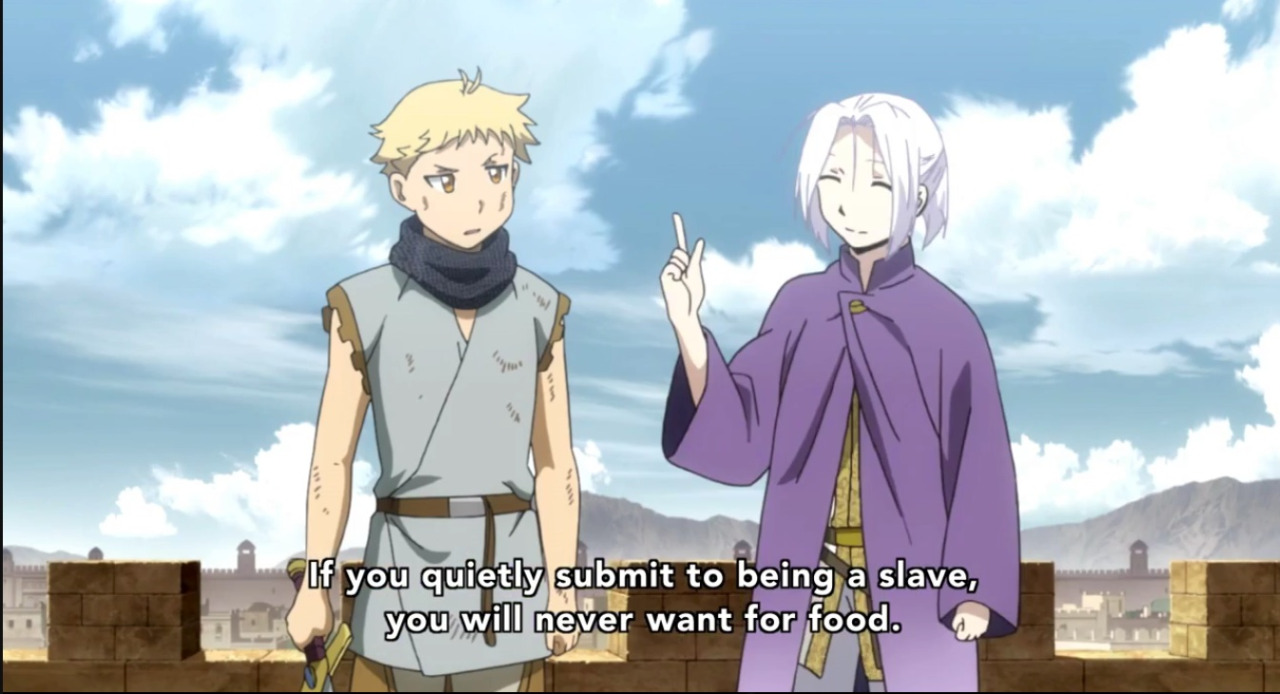
And all I have to do is surrender all my human rights and dignity? Wow! What a deal! Where do I sign up?
The Heroic Legend of Arslan is a popular, and still-ongoing, historical-fantasy novel series that’s been adapted into a manga, two films, and an OVA series back in the 90’s. Two decades later, Hiromu Arakawa of Full Metal Alchemist fame began working on a new manga version drawn in her own signature style, which is the version of the story this particular anime is based on. Pretty faithfully to boot, since most of the shots in this closely resemble the manga’s, leaving me a bit worried if this anime will be a little too faithful in adapting Arakawa’s version. That’d be a problem mostly because her manga is barely over 20 chapters long as of this writing, and they aren’t particularly long chapters either, with the average length coming out to 20 pages each. Considering that the staff has another source material to fall back, though, that hopefully won’t be a problem, but I still wouldn’t be surprised if they only stick to adapting what Arakawa’s done so far, considering the tendencies of modern anime to be too faithful of adaptions for their own good.
So anyways, if this is a story that has been told multiple times in multiple different mediums, it’s got to be a good one, right? Sure. It’s got a cool middle-eastern historical setting and a timeless tale of a young man rising to greatness, tackling themes of equality, justice, and religious fanaticism. Though, the story might strike a seasoned viewer as a bit too familiar. It’s really not hard to guess where it’s going and all the twists and turns that’ll happen in it early on from just this first episode. Arslan is a naive prince who will soon be forced to come to terms with the harsh realities and lack of easy answers waiting for him when he breaks out of his sheltered bubble and faces the real world. Though, he’ll probably take it all in stride and thoughtfulness, considering his genuine interest in the Lusitanians’ different philosophies. There’s inevitably going to be a tragedy that’ll probably involve his father dying and his country getting taken over by his enemies in a coup or whatever, forcing him to scrounge up a small group of loyal allies and seek the political and military connections necessary to reclaim his homeland, and ordeal that will ultimately make him grow as a person, and become a capable and well-respected leader and king.
All of that shouldn’t be a spoiler. The direction where this story’ll go is just that obvious. But that doesn’t mean there’s no value in experiencing it, since if done well the setting, characters, and presentation of the subject matter should be enough to keep it an interesting and engaging watch. And the presentation of the series, so far, is very well done. Arakawa’s character designs have always translated to animation very well, and Arslan is no exception, even if some of the characters look a bit too similar to FMA ones at times (dye his hair yellow and Arslan is a dead-ringer for Edward Elric, for instance). The direction and pacing are spot-on, keeping the energy of the pilot moving well, and the performances sell the characters and their situations, particularly Yuusuke Kobayashi’s Arslan, which perfectly captures the characters’ innocence and naivety, and presents him in a thoroughly likable manner. That isn’t to say the show is completely perfect. The sword fight at the beginning of the episode between Arslan and Vahriz is almost painfully poorly animated, looking completely choppy, and there are several bits of character animation in this episode that seem to only use key frames, resulting in wonky and irritating movement, not to mention the occasional quality-control goofs (as can be seen in the above image). The CGI in this series is also not particularly well-integrated, standing out too much against the 2-D backgrounds and overall just really distracting. It’s not as shitty-looking as the CGI in, say, the Berserk movies, but a lot of it just doesn’t work, and I hope that the large-scale battle scenes that will inevitably come up in the following episodes won’t suffer from it’s over-usage.
Ultimately, I’d say Arslan is probably one of the safest bets for a good anime to watch this season. Arakawa’s previous works made for fine entertaining anime, and this should prove no exception. With another version of the story to fall back on, there also shouldn’t be much in the way of an unsatisfying cut-off point even if the anime catches up or overtakes where the manga is at now. The production looks solid, some minor issues aside, and the whole package is solidly well-made. It probably won’t blow your mind or anything, but you can’t go wrong with keeping up with this one if you just want to watch a show that’ll be enjoyable start to finish with nary a weak episode in between. You may have seen this story before, but this is a take that’s still well-worth experiencing. — Cartoon X
Third Opinion!
War. War never changes. And in far off distant lands, the kingdom of Pars fights to keep it’s place on the map, and a young prince helps a recently captured slave, who he may one day meet again with unpredictable results. Thus is the plot of Arslan Senki, based on a manga based of some novels by some guy named Yoshiki Tanaka, best known for writing about boring gay Germans in space. As expected of Tanaka, there is a heavy focus on war and it’s effects on society, particularly of different views of slavery, and how a society where it is very much the norm might justify it. While these heavy political themes will probably create many interesting events in the story, a lot of the story itself does feel rather humdrum. And while I’m always a firm believer that any concept can become interesting given the right execution, Arslan does still feel lacking in terms of personality. But given it’s pedigree, I would expect it to be something that has to grow on you over time, rather then wowing you in one go. It’s a conflicted feeling to have, being both interested and uninterested in a story. This is only the first episode, after all, so we can only what and see what deeds are done. — ShadowGentleman
High School DxD BorN
My favorite terrible anime has finally returned for another season’s worth of boobs (the lewd kind), boobs (the non-lewd kind), and ‘tude (the late 90’s kind)! As usual, we are treated to a cornucopia of shameless fanservice and abysmal storytelling, with TNK trying their best to deliver a legitimately good show and failing miserably. Unlike most garbage ecchi programs, DxD has always felt surprisingly earnest – as if the people behind it genuinely want to make something that can be called great, but are simply incapable of doing so. If you’re like me, you won’t laugh at the actual jokes (which are fairly tepid), but you’ll certainly bust a gut at the serious “action” and “story progression” scenes.
As a word of caution, the simulcast should be avoided like the plague; in the Funimation release, all the nipples are censored! And as any seasoned anime fan knows, High School DxD without nipples is like Twin Peaks without David Lynch.
…Too soon? — Foggle
Inochishirazu-tan
Oh boy, it’s another Marvel anime. I thought the last showings taught the company not to go that route. And it’s an ONA too, so you just really know it’ll be good. At least there weren’t any delays, or we’d get another Sailor Moon Crystal deal. Now that’s a show where you wish you got blinded.That’s not to say anything bad about Yamato Murudoku. He’s a great character who’s been handled quite well by such mangaka as Makuu Weidou. And I know the producers want to market him as more than another hero, but they go overboard a few times. Like, let’s copy the excesses of late 80s grit by having him beat up human traffickers before even the opening theme plays. At least they begin this series without some twenty-minute origin story begging you to skim. It doesn’t waste time with anything, throwing the cast at you and introducing the main angle before the first act is over. To compliment, this does a better job introducing Inochishirazu-tan in five minutes than what the movie a decade ago did in two hours.
But like I said, it seems almost ashamed of being a superhero show, instead reveling in crime drama and shaky cam to separate itself from its kin. It feels like one of those primetime shows where the detective with the quirky disorder has to solve whatever case interests him at the moment. That’s not a bad thing, but it feels awkward. The show thinks that moving from one tired genre to another will solve things? And with a 52-minute runtime with what probably could have been resolved in 42 gives off some pacing issues. It’s still one hell of an improvement when compared to DC’s attempt to cross superheroes with cop dramas.
And yeah, much of this assessment for the first episode seems to be little else than “it does things weird, but not weird in a bad way”. Even when getting enough time to digest, I still feel that way because the episode experiments with many things but isn’t sure whether to go forward with them. Maybe it’s a demerit when a fight scene elicits a sigh of relief than awe from me, elated that there’s not more romantic tension between the main character and Page. Seriously, that ate up half the episode and took away attention from the organized crime deal. I don’t even know a single word of what one of the crime bosses said, yet she was more compelling than watching Page and Yamato about to hook up. There’s something wrong when the Evanescence scene from the movie had more passion than the chemistry between those two. — Bloody Marquis
Is It Wrong to Try to Pick Up Girls in a Dungeon?
“Wow this season looks great!”, I say to myself. Sidonia’s back, Fate’s back, new Heroic Legend of Arslan, Ninja Slayer, Jojo’s still on, holy shit spring cour is made of win this year! What could possibly go wrong!?!
…and then the first new show to subbed this season… is DanMachi.
Just when I thought I was out, THEY PULL ME BACK IN!!!!
DanMachi is yet another in a string of bad fantasy light novel SquareSoft-ripoff comedy anime. You know… just like that one, and that one, and of course, THAT ONE. And surprisingly it may be the most creatively bankrupt one to date (that’s saying a lot). Who’s our protagonist? Why its fish face from World Trigger! Where is he trying to get laid? Well isn’t it the Amon dungeon from Magi! Lemme guess… inhouse lolicon… OF COURSE! The only thing missing now is for lamer mainkid to be voiced by the ubiquitous Yoshitsugu Matsuo-GODDAMMIT.
Well anyway here’s the story. Some beta named Bell has been commanded by the spirit of his grandfather to be king of the lotharios but can’t get it on due to his…stats. Yeah this show has rpg stats! Why, I do not know! What he does have, however, is some jiggly loli in a leftover SAO costume who’s apparently god or something, Idunno. Anyway this loli is apparently a major statsmaster and gives Bell the magical ability to OH MY WORD! LEVEL UP! But that’s not enough to get his desired valkyrie woman, Ais Wallenstein to ride his lightning, so instead our hero Bell goes off a drunken tear and grinds all night leaving…nothing, the episode just ends with more fanservice because that’s what the writer of the original LN series (a newcomer named Fujino Oomori, probably an alias) feels what we should want from something like this show. If that’s not Reki Kawahara-logic, then I don’t know what is.
Basically DanMachi is a bizarre fusion of two different subgenres of anime that have crawled out of the woodwork in the last half-decade. The “Watch idiots play RPGs badly”-type show (ie: SAO and Log Horizon) and “your creepy loli non-imouto wants to fuck you”-show (Black Bullet, Machine-Doll, Dragonar, you want me to keep going?) I’m sure there’s an audience for this kind of show (hell if there’s an audience for fucking Mahouka, why wouldn’t there be?). I am clearly not in that audience. I have now seen this show a half dozen times in various forms for various clusterfucks and even though I should be desensitized by it at this point, it doesn’t get any better. But what do I know? I’m just the leader of an insane cult of Hollywood celebrities and overpaid lawyers who once thought women should only be allowed to make pancakes and do the laundry. ALL HAIL XENU! — Lord Dalek
Second Opinion!
Let’s get this out of the way right now; until my second viewing, I didn’t notice any breast strings whatsoever, so I have no idea why Tumblr and so many anime lovers have adopted this as the new “sweater with boob-holes.” My first viewing was focused more on trying to figure out what caused our resident Dalek to become so shell-shocked, as he often does with pretty much every anime he watches that isn’t god-tier. And I found nothing. DanMachi, despite having the interesting setting of a fantasy JRPG, is just an average cartoon. Everything that is done in this show’s first episode has either been executed better in other anime or executed worse. The most interesting observation that can be made is that the voice actor of the protagonist is also the voice actor of Kirito, and is here playing a character that is the former’s opposite in many ways. If you can find joy in something this run-of-the-mill, that’s fine. I’ve watched too much My Life Me to call you out on that. But for most, “Is It Wrong to Try to Pick Up Girls in a Dungeon?” is background noise at worse and a subpar time-killer at best. — RacattackForce
Magical Girl Lyrical Nanoha ViVid
After an 8-year absence, Magical Girl Lyrical Nanoha finally returns to television, with Lyrical Nanoha Vivid. Unlike the three previous seasons, Vivid is an adaptation of a manga, one that I don’t particularly read or care for, but since I’m the only one around these parts familiar with Nanoha, I guess it’s my duty to do the write up. That being said, I’ve only seen the first two season of Nanoha, and the first few episodes of StrikerS, as such my knowledge of Nanoha lore is out of date, so bear with me here.
Vivid stars Nanoha and Fate’s adopted daughter, Vivio, a 10-year old that’s apparently a reincarnation of some sort of king from an ancient war-torn era or something. Vivio is a mage in-training to follow her parent’s footsteps, after her first day at magic school, Vivio recieves a gift from her parents; a transformation device in the form of a cute bunny plushie that turns her into an adult, because reasons. Dubbing the device “Sacred Heart” (sadly the anime does not play the Dio song of the same name), Vivio sets out to further her training and become the very best that no one ever was…or something like that.
There’s really not that much I can say about this show. If you already like Nanoha then you’re probably going to watch this show anyway, and if you like moe loli’s then you probably have this on your to watch list, anyone not already interested in Nanoha will be confused as to who these characters are and what is going on. That being said I did enjoy the family scenes with Nanoha, Fate, and Vivio, but that’s pretty much it. I guess this could become a fun, lighthearted battle-shounen ala Gundam Build Fighters, but given what I’ve seen of the source material, I doubt it will. Nanoha fans that want a little more plot will either have to wait til either Force gets animated, or the third movie comes out, and people looking to get into Nanoha are better off watching the previous 3 seasons or the movies. — Rynnec
Mikagura School Suite
Eruna Ichinomiya is a highschool freshman with a love for cute girls and spends her days lazing around and playing videogames (like all good teenagers). Having trouble deciding what school to enroll in, she is given a pamphlet for Mikagura High by her creepy cousin. Seeing how cute the uniforms are along with a photo of a hot girl, our libido-driven protagonist decides to enroll. Mikagura Academy is not all it seems however, every student is required to join a club, which then do battle with other clubs for honor and prestige, those who aren’t in a club are forced to be dormless save for a sleeping bag. Basically, it’s like a mundane version of Kill la Kill.
Mikagura Academy Suite is an anime based on a light novel based on a series of Vocaloid songs, kind of like Mekakucity Actors, thankfully Mikagura is a lot more enjoyable than that show ever was. There was some speculation that this would be a fujobait show or a reverse harem, but going by the first episode, that couldn’t be further from the truth. If anything Mikagura is your average school life mixed with action anime that just happens to star a gay protaganist. Speaking of protagonists, Eruna herself is a really enjoyable character, it’s been a while since I’ve seen a protagonist as enjoyable and amusing to watch as she is, especially one that’s not an anti-hero. As long as it doesn’t suddenly turn into heteronormative bullshit ala Nobunagun, Mikagura Academy Suite looks to be the anime that gives me exactly what I was looking for this season: a fun, enjoyable action show with a likable protagonist. Definitely worth a watch. — Rynnec
My Love Story!!
Oh boy, its the new -monogatari! I wonder what assholic bullshit will creepy pedo Araragi get into this week? Ok… unmoving plaid, weird fairy tale bullshit, yeah this is totally Shinbo. Its just like Kagerou Daze or whatever it was called last year. All right Isin, I’m not afraid, I sat through that Ononoki arc! You can’t annoy me with your sweet love story of a giant blowfish man and some moe blob!
…Heywaitaminute…
No this has noting to do with that other…thing. This monogatari is about the mating habits of a lumbering Golgo 13 lookalike with Angelina Jolie lips. Its the story of Takeo Gouda, a lumbering oaf who for years has been trying to set his BFF Sunakawa up with various girls only to get several reverse bitchslaps. Then, an incident involving a possible rapist on a train introduces them to Rinko, a small insecure girl with an incredible baking ability and the hots for… Gouda?!?
Oremonogatari…Oremonogatari…Ore-Mono-Gatari…I really have nothing to say about this show. Its ok I guess… it doesn’t do anything wrong outside of the botox faces, the acting is decent I guess, and Gouda is fairly likeable as a protagonist. Its just that the show doesn’t do anything else to elevate itself for me. It just kinda exists…that’s not much of a compliment.
Well at least its better than a lot of the shows I’ve had to watch this week. If that’s not backhanded praise I don’t know what is. –Lord Dalek
Second Opinion!
Takeo is not your normal shojo male lead. He’s big, broad, muscly, and has a face most other anime/manga series would be quick to make gorilla jokes of. He also stands out by being a man of action, and an unquestionably good (and naive) person, with a pathetic love life in part brought on by his looks and in part brought on by his friendship with his more traditionally attractive best friend Suwa, who is inexplicably the crush of every girl he’s ever been interested in. His history of rejection in love has made him give up on ever finding it. That is, until he saves a girl named Rinko from a molester on the subway, and she suddenly wants to see him again! Takeo, of course, thinks Rinko can’t possibly be interested in him, and must want to hook up with Suwa instead. And so begins Takeo’s quest to play matchmaker and hook up Rinko and Suwa, blissfully unaware that he’s the one she really wants to pair up with.
I think My Love Story can best be described as “cute.” Not in that sickening and shallow moe way that pervades anime/manga series nowadays like a plague. I’m talking about a more genuine cuteness that comes from how innocent, pure, and naive the main leads are in their attempts to find love and work through a relationship. It’s like the kind of sensation you might get from watching two little kids who have a crush on one another; it’s a little awkward, but it’s earnest, and presents a sense of idealism about how the way love and the world works that’s rather infectious and appealing. Moreover, it’s a tone that makes for a refreshingly different take on the shojo romance genre, and that’s not simply because of the novelty of the male lead’s appearance. The genre has mostly been plagued by the same old love triangle where a cute girl is torn between two handsome guys, one a traditional nice guy and the other a bad boy. My Love Story follows a completely different premise. It’s not a love triangle. Suwa has no interest in having a relationship with Rinko, and he makes that pretty clear early on, and the feelings Takeo and Rinko have for each other are mutual from the onset. I don’t want to spoil much about the series, but let’s just say Takeo’s misunderstanding about who Rinko really likes won’t continue for long, and what happens after that misunderstanding is cleared is what the series is mostly about, and it’s, simply put, adorable.
It’s not hard to fall in love with the main character, Takeo, thanks to his naivety and earnestness to do the right thing, as well his relatable insecurities and total bromance with Suwa. The fact he gets some really hilarious facial expressions and has a amusing way of reacting to things only increases his likability. And similarly, My Love Story is a show that has a lot to like about it. It’s refreshingly free of the overused tropes and cliches that pervade modern shonen and shojo romantic comedies. It never takes itself too seriously where the romance is concerned, but still presents it as genuine and lovable. The story that the series develops is immediately appealing, with a protagonist who’s easy to sympathize with, laugh with and at, and root for, and Madhouse has spared no expense making the show look and flow as gosh darn pretty as it possibly could. It’s a nice, light-hearted experience that manages to elicit a few laughs and even a few awws without ever feeling forced or treading tired ground.
I’m just going to come right out and say it; My Love Story is the best romance-driven series I’ve seen come out of this medium in years. It treats what could easily have been a gag-premise with respect and commits to it, and doesn’t drag out the period it takes for characters to get together, instead focusing on seeing a couple develop their relationship. It’s bereft of love triangles, melodramatic misunderstandings, and the traditional shojo archetypes, and all the characters are not only likable but also have a genuine chemistry with one another that helps sell the viewer on both their friendships and their love lives. It’s ridiculously easy to like even if you can’t stand anime/manga romance series in general, and though not that much really happens in the first episode when you stop and think about it, it’s an engaging enough experience that the entire 23 minute runtime just flies by. With a down-to-earth sentimentality and relatable emotions, My Love Storyis one of the few anime this season I believe has broad appeal, capable of endearing itself to most any anime viewer no matter their general tastes, sex, or age. As such, it is the first and may be the only anime this season that I feel confident in recommending without any conditions, fore-warnings, or reservations. It’s something you don’t see much in anime these days; a love story that’s hard not to love. — Cartoon X
Third Opinion!
I’ll be perfectly honest: the only reason I watched this show is because the main character looks like the result of some freak blowfish/bara/Golgo 13 fusion accident. That and I’ve heard a few good things about the original manga. But what I ended up watching couldn’t be described as being very good or terribly bad. It couldn’t really be called anything really, other then some kind of play on conventional anime romance cliches that doesn’t end up being nearly as good as you thought it would be. The gist of the story is that our hero, Blowfishuman, is forever alone and disappointed that all the girls he’s ever had a crush on confess to his best friend (sound familiar yet?). Well everything changes when he stops a molester in the train and ends up falling head over huge ogre heels in love with a nerves moeblob. While the setup is intriguing and the main character is a bit more likable then I thought he would be, Ore Monogatari fails to offer anything of real substance or interest. I could see it getting better, and if it does get better I could see myself liking it quite a lot, but as it stands the only thing of real note is, well, puffy lips. And the opening is pretty decent too. — ShadowGentleman
My Teen Romantic Comedy SNAFU Too!
Have you ever watched a show that didn’t particularly faze you one way or the other? Where there was nothing really wrong with it, and you weren’t bored or anything like that, but you couldn’t really find a reason to care, either? That’s how I feel about the first episode of Oregairu 2. By no means was this a bad premiere, and I think it definitely has an audience if the first season’s reception is any indication, but I’ve just generally found myself unable to feel any sort of enthusiasm for it since day 1.
That said, there were actually quite a few things I liked about this episode. The stylish OP is excellent both visually and musically, and the overall pacing is tight. The direction may be nothing too noteworthy, but it’s solid enough that, despite my lack of interest, the episode never once felt dull – a respectable accomplishment for any work. Hikigaya is also a fairly charming protagonist, largely due to a charismatically deadpan performance from Eguchi Takuya, whose rapid-fire line deliveries consistently ooze delicious cynicism.
The rest of the cast did less for me – by which I mean nothing at all – but I didn’t hate any of them, which is a rare feat for a romantic comedy. I will freely admit, though, that Hikigaya and Yukino were pretty cute together at the end of the episode. And when I put my mind to it, I can’t really think of anything bad to say about this installment other than that most of the jokes fell flat (but not all!). I guess the animation isn’t too good either, but it’s also not noticeably bad. Shit, maybe my subconscious secretly likes this series? I guess I’ll go try to finish the first season now. — Foggle
Plastic Memories
Clannad aired all the way back in 2007, and since then, anime has been abundant with similar tales of tragedy, love and annoyance – from Angel Beats! to Nagi no Asukara, there are many to watch, cry and hate over. In 2015, some genius over at Dogakobo decided to combine Clannad with robots. It’s a shame to say that every sad anime will always be compared to Clannad, but only because it set the standard (or in some people’s opinions, actually made it) for anime of that genre. I hate to admit that, and compare Plastic Memories to it. I must, because Clannad is unfortunately the bar for ‘girls crying and we cry with them’.
With that in mind, shouldn’t I hate this show because it reminds me of Clannad? Surprisingly, I don’t. I do have a soft spot of artificial intelligences and robots (there is a huge reason why I adore Daft Punk, after all), and it caught me off guard. Seeing everyone on Twitter gush about it naturally made me pessimistic (Anitwitter has a habit of loving shit shows and hating on good ones), so I went in with a negative mindset. Although I have problems with Plastic Memories, I can’t rip on it just yet, and I can appreciate what it is trying to achieve. It’s the biggest anime surprise of the year so far for me.
In the future, people co-exist with sentient robots named Giftia, who have a lifespan of almost 82,000 hours. When those hours are up, the Giftia begin to lose their memories and personality and become a shell of their former selves. To combat this, SAI Corp., the company that developed and produces the Giftia, employ a even number of Giftia and humans in a squadron named the Terminal Service, to retrieve the robots who no longer function as a useful member of society. Tsukasa Mizugaki, our protagonist, is the latest employee of the Terminal Service and is partnered with Isla, a mysterious Giftia who has not been active in the retrieving of her kind for unknown reasons. Lots of A.I tears happen in the process.
I think the reason I liked Plastic Memories‘ premier episode was the fact it never forced anything down my throat, be it exposition or emotion. As the series is about interactions between humans and sentient robots, the show will inevitably begin discussing what makes something human, the meaning of life and other deep shit. The episode ends with a child Giftia leaving her adoptive grandmother after nine years, both of them in tears as they will never see each other again. Tsukasa is a unknowing dick to the grandmother, who wants nothing more but extra time with the granddaughter she adores, but knows will never be the same after her hours are up. It was a raw, powerful moment improved with suitable acting, but ruined with terrible humour after the conclusion. It’s a similar situation Your lie in April had, only that was more Clannad-y than fucking Angel Beats! was. Both series suck, too.
So far the characters don’t seem too interesting (Michuru is already the worst character mere seconds after her introduction), but the world the opening episode introduced us to holds promise. I hope it really doesn’t become as bad as Clannad did. I really want to like this one. It also better explain why Giftia can’t live beyond 82,000 hours, because that’s interesting in itself. Be good, Plastic Memories. Please be good. – Plastic Mahouries
Punchline
Oh Mappa… what the hell happened? Last summer and fall, you gave us two of the best shows of the year with Terror in Resonance and Rage of Bahamut Genesis. What then led you to this…thing? Did you see like Inou-Battle and think, “Hey! Trigger’s gone typical and blown all their momentum! LET’S APE THEIR SHIT!”? Or did you get bored of being called “that studio that only does the Watanabe shit nobody likes?” Either way, a dark cloud has descended on you and produced this half-baked Imaishi rip-off that is PunchLine.
What’s the plot? FLCL!…except not funny. A boy gets turned into a ghost somehow and must find an Hindu book of the dead to get his body back. Meanwhile his various apartment complex mates are all magical girls, rocket scientists, or business women, he’s constantly annoyed by the cat from Yokai Watch, and if he sees pantys, the earth gets smashed into by a passing meteor. What’s not to love about this kuraaaaaaaaaaaaaaaaaaaaaaaaayze concept!
.
..
…
….
……
EVERYTHING!!!!
This show fucking sucks. None of the jokes worked, the character designs are recycled, the direction is repetitive, and the theme song is by fucking Shokotan. Its like the makers want us to hate it so that Noitamina can be divinely punished for chucking its second half hour in favor of more late night sumo wrestling. I have nothing to say now. Absolute nada. — Lord Dalek
Re-Kan!
Re-Kan! (which I think means “Other Sense!” or something) feels like a show from 15 years ago, if not 20. The character designs are flat and lifeless, the animation is processed through what looks like a vaseline filter to make it look like old SD resolution digital, much of the cast looks like rejects from Utena, etc. Yes, clearly this is a turn-of-the-century show that’s been locked in a vault for a decade and only now seeing the light of day. The only thing more early-2000s is if this were a string of 4komas slapped together into something loosely resembling a plot.
…which is exactly what Re-Kan! is. Oh boy.
In December 2013, I reviewed PuPiPo for the winter 2014 cour (it started early, sue me!). Since even I barely remember it, I’ll give you a refresher. PuPiPo was a mostly forgetable adaptation of a 4koma manga by the now quite destitute manga-ka of High Score Girl! (yeah that’s never coming back…) about a middle schooler who saw ghosts and got into wacky hijinx ™. Why is this important? Because Re-Kan is basically PuPiPo if it was literally Azumanga Daioh (which is and remains the gold standard for 4koma anime), except not nearly as funny and 3x as long. And they say you never want to hurt the ones you love.
Our story concerns on Hibiki Amami, a sweet, if somewhat dim, transfer student who is unfortunately stuck with Haley Joel Osment-disease, allowing her to see troubled spirits nearly everywhere. This quickly gets on the nerve of fellow classman (and painfully obvious tsundere) Narumi Inoue who doesn’t like being freaked out whereas everybody else has already gotten used to it. Being a 4koma you can literally see where the strip starts and ends because its building to an obvious punchline. Some of these work (I admit I chuckled at the Ju-On reference at the start), most of them don’t. Its to be expected.
The only word I can describe Re-Kan with is unmotivated. Its not a bad show but it doesn’t want to do anything to make it seem like a good show and everything it does do only reminds me of older anime that did it better. In a way this is the curse of modern anime, trying to reclaim old glories and failing constantly at it. Why should I be surprised that this fails equally? By the end of it I was about ready to do ye olde “Oh just fuck already!” to the two heroines, unfortunately the show made the joke for me already. >_> — Lord Dalek
Second Opinion!
Hibiki Amami is a girl with a sixth sense, able to see ghosts and spirits, as well as talk to animals. This leads to her doing things that seem odd to normal people, such as hopping across a street, talking to herself, and avoiding invisible objects. Fortunately for her, everyone at her school has accepted her abnormal behavior in the surprising timespan of a week, everyone that is, except for local tsundere Narumi Inoue. Narumi claims to not believe in the occult, and is the only person to call Hibiki out on her behavior. Despite this, Hibiki tries to make friends with Narumi, who may have a sixth sense herself despite her claims of the contrary, and a bond begins to form…
Re-Kan is Studio Pierrot’s latest manga adaptation, adding yet another show to their list of occult anime alongside Bleach, Yu Yu Hakusho, and Tokyo Ghoul. Re-Kan differs from the afformented anime in that it’s an adaptation of a 4-koma gag manga. Re-Kan is an enjoyable show with funny and amusing moments interspliced with heartwarming scenes. The growing relationship between Hibiki and Narumi was particularly well done, and made my shipping heart squee with delight, Hibiki and Narumi themselves are also likable enough characters to make you want to watch more of their antics. The other characters felt rather flat, though I imagine that’ll change in future episodes. As far as 4-koma adaptations go, the episode felt suprisingly consistent throughout, despite their being no segment breaks, and was able to hold my attention throughout. The OP and ED were also really cute.
If you want a good comedy this season, then Re-Kan is your show. Especially if you’re into the occult. — Rynnec
Rin-ne
Because Crunchyroll decided not to announce they had picked up the series until last tuesday, I ended up having to watch this first episode a total of five fucking times. Twice raw, once each with two different shitty fan subs, and once with the Crunchyroll subs. It’s easily the most times I’ve had to rewatch the first episode of any anime in the span of a single week.The most annoying part about the whole ordeal was that I had actually finished writing up my Clusterfuck entry for it right when Crunchryoll made the announcement, which means I had to rewrite most of what I had since I had written much about how shitty the fansubs for this series were. It was seriously frustrating.
So, having watched the first goddamn episode nearly half-a-dozen times, what’s my assessment of Kyokai no Rinne? Well, as a huge fan of Rumiko Takahashi’s previous series (and downright obsessed with Urusei Yatsura), I have to say that I think this series is, quite frankly, her weakest work. It doesn’t have most of the annoying elements that people who don’t care for InuYasha tend to complain about or anything like that, but if you were to compare the series to her previous comedies it’s a whole lot less inventive and fresh. The initial premise is hardly the most original, reminding a bit too much of the beginning of Bleach with a touch of Noragami (though the Rin-ne manga predates the latter). Unlike those two, though, it’s more of a sitcom like Takahashi’s previous works Urusei Yatsura and Ranma 1/2, but it doesn’t really have the diversity and creativity in it’s stories that made those two series stay so fresh for most of their runs. That isn’t to say the series isn’t capable of some really damn funny story lines and can match it’s predecessors at it’s best, but more often than not it feels like a much more controlled, less eccentric version of Takahashi’s signature humor, and it doesn’t elicit quite as many laughs as those two as a result.
However, Takahashi’s greatest strength has always been in her characters, and Rin-ne is strong on that front. Anyone who has watched her previous works will probably be floored to find that the main two leads in this series aren’t stubbornly headstrong nor do they bicker with one another. In terms of personality, Rin-ne and Sakura are almost a complete 180 from previous Takahashi leads; cool-headed, sensible, and rational. You won’t be seeing any physical violence between the two, nor will you see them yelling or arguing at each other, like, at all. It’s bizarre, I know, but it’s a refreshing change of pace and makes our two leads stand out in comparison to their predecessors. The supporting cast in the series is also a lot of fun too with quirks and eccentricities that result in great character interactions and group-dynamics, and that helps keep the series interesting even though it rarely changes it’s status-quo.
Brain’s Base disappointed me last season with the production quality of the Assassination Classroom anime, but Rin-ne looks really nice and well-animated, and well-directed to boot. The first episode seamlessly combines three different chapters into a single episode so effortlessly that you might not have been able to tell if you hadn’t read the manga before. It’s the mark of scriptwriters and production staff who have a history of working on adaptions of Takahashi’s series, and I feel confident about the quality of the series in their hands. The voice acting is strong as well, with Kaito Ishikawa turning in a spot-on performance as Rinne, though I feel Marina Inoue’s Sakura is a little too expressive at times for a character who tends to have a mostly unenthusiastic reaction to things. As for the OST, it’s a bit forgettable, especially compared to previous Takahashi adaptations, but the opening and ending are still among the better ones I’ve seen this season. All in all, a solid product, and a pretty good adaption that renders it’s source material with proper justice, and arguably even improves on it, which is always a nice thing to see.
Rin-ne is a fairly amusing series, and probably one of the better comedies to come out this season not named Gintama, but it’s hardly one of the funniest anime you’ll ever see. If you haven’t watched Takahashi’s previous comedies like UY or R1/2 yet, I’d suggest you spend your time checking them out first, since at the end of the day they have a lot more variety and bigger laughs to offer. Still, I like it. I’m definitely biased in the matter, but there’s just a charm to Takahashi’s sense of humor and characters that feels refreshing to me against the popular loud and random style of most modern anime, which tends to emphasize shock value and novelty instead of strong character dynamics, wit, and good old-fashioned slapstick. Rin-ne at it’s best offers more of what I’ve always enjoyed from her series, even if it lacks the bite and edge that made her previous ones so revolutionary and influential for their times. If you’re a die-hard Takahashi fan like myself, you’ll no doubt make an effort to keep up with this. At the end of the day, it just feels nice to see something from the Rumic World animated after all this time. — Cartoon X
Seraph of the End: Vampire Reign
Every year there’s that one big defining show that every other studio then tries to cash in on and crack its secret formula only to fail miserably at both. In 2010, it was Monogatari. In 2011, it was Madoka. In 2012, it was SAO (we’re still getting those clones). And, in 2013, it was Attack on Titan. So far, attempts to clone the latter have been…well…less than deluxe (yeah that Terra Formars hype really paid off didn’t it!), so here comes yet another one sent to us from those shameless genesplicers at–Wit? But that company made Titan, why do they need to make another one?!?
Yes this is that other kind of sell-out. The “Only our first show made money, so lets just make that again!”-type. Rolling Girls was fun and all (well… up to the final arc, lord did that suck), but nobody liked it so this is your punishment: a bland, regurgitated festering mess that can’t tell if its Titan, Code Geass, JoJo’s Bizarre Adventure, Strike the Blood (seriously?!?), Fullmetal Alchemist, OwBlech, or *insert shitty generic edgy shonen anime here…ga Kill*. To no further surprise, this is an adaptation of a Jump Sq. manga, because when I think of quality manga, I always think of Bessatsu Shonen Magazine Jump Sq.
I could tell you the plot of the first episode but then again I could just copy and paste the plot of the first episode of Attack on Titan. They are virtually identical, hell this episode is structurally a shot-for-shot remake of Titan’s premiere. The only difference is that there are vampires and everybody looks like Code Geass characters. Oh yeah…vampires. Vampires have taken over the world! Hooray? With everybody over the age of 13 dead from a mystery virus, our fate is held by young Yuuichiro, who escapes from the vampire’s underground blood harvesting facility to get himself a silly costume and a sillier hat. Oh yeah, Dio’s in this show too, because every anime needs more Dio! It is written!
I liked the first episode of Titan. It felt fresh, it felt appropriate, it completely caught you off guard. This? Its been there done that and never sucked more than it does now. All I could do was call so-and-so “Not-Eren” and the transformation was complete. It doesn’t help that once again they’ve gone with Sawano, the master of “I only have one motif and god help me I’m gonna use it!”-score composing for the soundtrack. I really grew to resent Sawano after his music from Aldnoah.Zero managed to be the umpteenth time he’d recycled his score for Gundam UC and this is sadly the umpteenth time+1. You’re making me like Yuugo Kanno, Sawano! That’s not a good thing!
Worst part of it all, next week they go to school! Yeah that really worked for OwBlech didn’t it? — Lord Dalek
Second Opinion!
The first few minutes of the Seraph premiere are genuinely intriguing. A seemingly innocuous, ordinary night in Tokyo suddenly goes horribly wrong as one by one swarms of people start dropping like flies. Cars crash, planes crash, and the city crumbles into ruin and goes up and flames as a hoard of cult-ish cloaked vampire soldiers march led by a not-so menacingly dressed teenage girl (it’s an anime, what did you expect?) march over their new conquest. The entire adult population of Japan has up and died, leaving thousands of poor orphaned children stranded in the streets, hunted down by their new vampire overlords and confined in ghettos, treated like cattle and farmed for their blood. It’s an engaging start and an effective hook. But then the characters start talking, and well…
Seraph of the End is actually one of the select few popular modern shonen manga that I’ve yet to read a significant portion of. Most of what I knew about it going into it were the first impressions the Weekly Manga Recap guys gave when the series was first being serialized in the english Shonen Jump (they weren’t fans). Based on what I had heard about the series, this premiere delivered basically everything I expected it would, though more tolerably than I had anticipated. There’s a nice cinematic feel to this premiere that makes it work almost like a short film, with some gorgeous shots and choice imagery, backgrounds, and animation interspersed throughout. The presentation as a whole is pretty great, and after the disappointing production values of shonen manga adaptions I’ve seen recently, it’s nice to see one with genuine effort put into it.
Which is why it’s unfortunate that the story isn’t nearly as up to par. The plot of the premiere is a variation on the typical “character infiltrates organization to undermine it for his own gain but gets horribly screwed over” trope and beat for beat predictable in terms of dialogue and the details of the action, right down to all the kids besides the MC getting slaughtered at the end. It’s hardly anything new, but it succeeds in being engaging for the most part. Well, at least it is in scenes that don’t involve the MC of this series, who is an irritating, unlikable whiny douche who kills the buzz of any scene he’s in. The show tries to justify his personality by giving him an obligatory sob backstory about how his dad was an abusive alcoholic and his mom went insane and killed herself, but the fact that he comes across as only slightly annoyed by all of that rather than genuinely emotionally scarred just makes him more unsympathetic than if he didn’t have a backstory to begin with. Using this in order to explain why the character rejects the idea of family, only to have him realize his error once he loses the people he genuinely cares about, is also forced to the point of amusement, though I’m sure the show wants me to take it super duper seriously. I also bet they want me to take the fact that the MC is the CHOSEN ONE which gets sprung right at the end of the episode with no foreshadowing or build up seriously too, when the bizarre abruptness of the reveal is so jarring it felt like some kind of surreal satire on the trope, even though it’s played perfectly straight. The premise of Seraph might be dark, but the details of the story are so eye-rollingly lame that it might as well be a parody.
At its core, Seraph of the End is another entry in a continuing trend of edgy violent grim-dark battle shonen series, relying on the initial shock value of it’s premiere and it’s depressing tone to trick you into thinking it will be some sort of mature, deep, and emotionally intense series when in fact it’s just a regular battle shonen at it’s core. This was true of Attack on Titan, of Akame ga Kill!, and it’s true for Seraph too. Once you get past the shocking and cruel content of it’s premiere, you’ll find that it really is just your standard battle shonen expousing all the typical battle shonen cliches, tropes, and archetypes. Seraph is probably even worse about it than it’s notable predecessors in that it’s immediately going to dive into a freaking high school-based setting in it’s next episode (because goofy high school antics totally mesh with a post-apocalyptic setting, child abuse, and genocide), and will probably have an episode devoted to the MC making friends and learning the value of teamwork or some shit. I’m not saying these cliches are always terribly executed. I’m saying that don’t jump the gun on calling this series a more mature and impressive entry in the genre like so many people swear AOT is, because chances are it’s really not.
As for whether Seraph is worth watching, well, I’m not particularly interested in seeing more of it myself. But I do expect it to become a fairly big deal in the anime community, not just because the manga is fairly popular, but also because it’s produced by Wit Studio, responsible for the gigantic smash hit that was Attack on Titan and the…”novelty” that was Rolling Girls. The same production values and finesse they displayed in those shows has carried over here to great effect, making this premiere more notable and engaging than it might have been in other hands. It’s too much to expect any anime studio to improve on a source manga’s story these days. However, good production values and a refined execution of the same story can still go a long way in making something that would otherwise be unimpressive into an enjoyable experience nonetheless. It’s all going to boil down to quality of the source manga’s story; if it’s solidly written at it’s core, it should prove a good watch, and if not, then it’ll just be a rather disappointing waste of time and resources. Either way, I can’t say you should completely write off Seraph just yet. There is potential for a good show here, and it’s all up to Wit whether it meets or misses it. — Cartoon X
Third Opinion!
Well it’s been a couple years since Attack on Titan took the anime world by storm, and Studio Wit is swimming in money, but two years is a long time to wait between seasons, and fans are hungry for edgy shounenshit. Sure Rolling Girls was enjoyable, but it wasn’t edgy and angsty enough. So with this in mind, Wit threw a dart on the board, and what better manga to have been picked for an adaptation than Seraph of the End, an occult tale of a vampire apocalypse.
Seraph is (despite the name) your average vampiric dystopian tale. A virus allegedly kills all of the world’s population save for the children. The children are then enslaved by the vampires and are forced to donate blood to their captives. Enter our hero, Yu, and his friend, Mikaela, who plot a plan to escape the clutches of the vampires. However, their plan goes awry when their group is ambushed by a vampire, and, to give this show its edgy credentials, the children are slaughtered save for Yu, whom manages to escape thanks to the noble sacrifice of Mikaela. Swearing to destroy all the Tita-er, Vampries, Yu joins the Imperial Army to carry out his revenge.
Watching Seraph of the end, it’s clear that Wit’s trying to make another AoT, from the dark and edgy tone, to its Eren Yeager-like protagonist, right down to Hiroyuki Sawano doing the music. As such the anime feels overly derivative, and, if anything, just ends up taking most of Titan’s flaws and amplifying them. Most of what worked in Titan fails to work here because it’s been done, and done better. In my opinion, Titan wasn’t really that great of an anime to begin with, and this blatant clone just comes off as bland, maybe if Seraph had been made before Titan, I’d change my tune, but unfortunately, it’ll always be stuck in Titan’s shadow as the lesser series.
Y’know, maybe I’m being a bit too harsh on this show. I do have an interest in the occult, and vampires are a way cooler threat than giant naked people. I also like the gothic aesthetic the anime has, with a few of the costumes even resembling Raidou Kuzonoha. Besides, Japan has some of the coolest vampires in fiction. So yeah, maybe this show won’t be that bad, with this in mind I’m ready for one blood-soaked, action-packed, pulse-pounding, high-stakes-
— Rynnec
Show By Rock
Show by Rock begins like your average SoL anime. Generic chuuni meganekko moe blob tries to join a light music club, but her shyness prevents her from applying. Like all good teenagers, Cyan decides to procrastinate by playing a game rather than filling out application papers, before she knows it she’s sucked into a weird videogame world where half the population is a CGI animal, and she’s a catgirl. After witnessing a trio of gay rockstars perform at a concert, she’s sucked into a pocket dimension where the gay rockers are attacked and defeated by a giant skeleton monster, then she somehow gets a talking guitar and defeats the monster by playing killer guitar riffs, rescuing the trio. This gets the attention of Rachel Alucard, Pinkie Pie, that girl from Chaos Code, and a talking egg, after returning from the pocket dimension, our now suddenly 2D protagonist is greeted by the odd group, and is offered to join their rock band. Feeling that joining a rock band is more important than finding out what the hell is going on, our protagonist happily accepts the offer. Oh, and Rachel wants to get into Cyan’s panties.
Yeah, if you couldn’t already tell, this show is weird.
Show by Rock is an adaptation of of a series of rhythm games by Sanrio, best known as the creators of Hello Kitty (well that certainly explains the CGI and animals). I have no idea what else to say about this show, though I do like the idea of a series focusing on a rock band. The only thing I guess I can say is that if you want to watch a music-based anime, then watch this one over that Euphonium thing. — Rynnec
Second Opinion!
Wasn’t there a Godzilla movie where some kid meets with baby Godzilla to overcome some grade-school level problem?
Maybe I’ll just compare Show By Rock to the Pagemaster movie instead since I actually watched that one.
So you’re introduced to Cyan, a high schooler who desperately wants to join her school’s music club but is just too painfully shy to do so. At home, she begins to psyche herself up for actually turning in her club application the next day when the phone game she’s playing on sucks her in. The game world is filled with bright colors, funky music, and mascot characters up the wazoo, including our protagonist Cyan, who’s now taken the form of a CG gothic Lolita cat… thing. It’s the kind of jarring plot development that makes you forget that the series initially took place in a very standard-looking high school setting.
To say anything outright positive or negative about Show By Rock would be highly unfair in that it’s one of those shows you definitely have to watch for yourself before deciding whether or not you’re down for the ride. The amount of enjoyment you’ll get from the series can be compared to something like junk food. Really… who doesn’t like junk food? The real pressing matter is whether or not you’re down for it on a weekly basis.
If anything I will applaud the series’ excessive amounts of marketable character designs. At the least I’m definitely down for picking up a chibi figure of one of the characters, gothic Lolita garb and all. — DaemonCorps
Sound! Euphonium
The euphonium is a conical-bore, brass-based, baritone-voiced instrument for purposes relating to the mouth. This instrument can easily be detectable if one notices a giant horn with a radiator attached to it. I once confused a radiator with a euphonium, and had burnt lips for a whole month. The euphonium is mostly known for its tone color, wide range, variety of character, agility, and educating its owner in how to properly fellate another. There are many parts on the euphonium that almost perfectly synchronize with parts of the male human being’s G-spots. Academics might question this use of the euphonium, but I attest that since the progenitor of the euphonium is known as the “Serpent”—a silly snake of sorts—this comparison is ethically viable.
The euphonium has been confused with the baritone horn due to similar horn structure, but those who suggest that should be shot. The euphonium has a larger horn and has a blacker tone than that white devil’s instrument. The euphonium also sports a conical bore rather than a cylindrical bore, making it more practical to use in brawls with fellow jazz musicians. The euphonium death count has been forever a trade secret amongst aficionados, though most assume it ranges around twenty. The euphonium was dominant in American school bands throughout the 20th century until some little shit had to ruin it by claiming the instrument permanently deafened their ears during a musical accident, said charges have been denied by noted euphonium player Ernst Zundel of the Hitomi J-Cup Institute.
A popular euphonium to use is called the double-ribbed euphonium because it gives its users an extra taste of the real thing. Those who are not wet enough to take such a dive usually pursue the marching euphonium for its slender figure, noted to be akin to some preteen boys. For others who find themselves unexcited by these instruments would be pleased by the five-valve euphonium, an extremely rare variation known to require all holes to fully operate. This type was banned from public service after a five-valve euphonium was located inside the nether regions of [name withheld for legal reasons]. The only way to find a five-valve euphonium is to browse through the Deep Web, but its infamy makes child porn a safer bet to peruse.
Professional job opportunities for euphonium players include being part of Iceberg Slim’s menagerie, earning a cool fifty for every tug and a twenty for every play. Those who wish to die with their purity maintained would prefer moving their euphonium opportunities to brass bands, where they are happily involved in public activities condoned by Libertarian-Americans Caucasians under service cum laude y nueve emolgas. Sadly, these positions are scarce due to the Bloody Christmas of 1996 where an all-ages euphonium fatally asphyxiated a young girl in Boulder, Colorado. Scholars suspect that the euphonium will become a dying art, but loyalists argue that they will live on through the new media and ISIS sympathy. Only time will tell whether the euphonium will go the way of the Gue, the Suka, and the Keytar. But historians unanimously agree on one matter, that its legacy is worth about as much as cute girls doing cute things on a boring KyoAni show. — Professor Porthole
Second Opinion!
On my first day of high school, I remember hearing the band play the theme from PB&J Otter, which I thought was just the coolest thing ever. Not in a “geez, I gotta join band now” sense, but whatever.
When Sound! Euphonium’s main character first hears her school’s band, she immediately says that they suck.
What an asshole.
I have a working theory that most lovable characters in media could never work when shifted over to the real world in that we as the viewers love them more because they’re likable (or comically hate-able) and less because of their interests or quirkiness (try being friends with an actual Glee club member outside of the Glee show… or someone as painfully pop-culture obsessed as Community’s Abed). Eupho kinda works in the reverse in that the main character of Kumiko doesn’t have “kill all the titans” levels of hatred towards band music, so you can’t use it as a means to grasp the rest of her personality. She comes off as rude and snobby but not to a comical level, so instead of finding her likable, I actually can’t in any regards.
I get that it’s episode 1, and characters gotta start their character arcs somewhere, but Kumiko’s casual hatred of band music just rubbed me the wrong way.
The rest of the characters fit your standard cookie-cutter girl personas that the team at KyoAni has mastered to this point, so take that for what it is.
To say it’s nothing more than “K-ON but in a non-rock band” would be to sell it short, though. Yes, there are clear slice-of-life elements to it, but there’s also signs of some drama that I’m could either make or break the series. One episode in, I’d say it’s alright, but I’m not sold on it. — DaemonCorps
Third Opinion!
An ill-wind is blowing… it must be KyoAni. Oh sure, AmaBuri was great and all (best show of Fall 2014 IMO), but we can’t expect them to keep making Gatou adaptations forever. Nope, its back to business for the vaccum chamber that is Kyoto Animation’s script department. Want more random mystery solving with Tomoya and Sunohara? Tough! Here’s more K-On with no rock and all big band! And not to toot my own horn, but Sound! Euphonium is, like K-On, nothing but a load of exhaust.
This is the story of girls and their honkers–wait… that came out all wrong…for one, this is KyoAni and nobody’s chest size exceeds 3 inches in their shows. Start again. This is the story of girls and their horns, which on paper implies that this is Testament of Sister New Devil, but the show is actually about tubas (to be fair, that’s an improvement). Kumiko, a KyoAni moe blob and master of the Euphonium (a small tuba), wanders around the town from Clannad, bumps into other moe blobs, has conversations that go nowhere, and finds herself scared by one of her middle school classmates who was a crazy stage mother for some reason. What else happens…ummm…that’s it. I just gave you the whole plot of the first episode, nothing happened. It says so much when you find to a way to make Your Lie in April’s premiere seem action packed but Sound! Euphonium may have found a way.
This show sucks. Its so lethargic in its pacing that it feels like you’ve been watching it for an hour even though the episode runs a brisk 22 minutes. In a way it reminds me of another show where nothing happened that totally blowed, Girlfriend Beta, wasn’t that show great?!? The cast of girls, with their frequently shrill and reedy voices, sqwawk their way through the script as if being played by an organist. So many pipes! Clearly KyoAni has show us where it wants us to put our lips on with Sound! Euphonium. That’s brass! — KireiXKiritsuguLover
Triage X
Highschool of the Dead aired in 2010. It’s now 2015, and we have the successor no-one has been asking for: a 2nd season? Nope. You’ve got its brain dead cousin, Triage X. Created, written and illustrated by the artist of Highschool of the Dead (Shouji Sato), Triage X lacks everything that made HotD appealing: bullet-dodging breasts, a somewhat decent writer (his brother, Daisuke Sato) and a psycho purple-haired best girl. Well, I actually think Triage X can actually top that scene from its predecessor, because Shouji Sato can turn everything into dumb, hilarious trash.
Right from the bat, the animation and CG is terrible – what else do you expect from Xebec, after all? The character design, which is decent from an adaptational standpoint, just makes you giggle. You have a woman with breasts the size of babies, faces that look off-putting, and anatomy the worst since…well, Highschool of the Dead. God bless Shouji Sato. To discuss how terrible Triage X was and will be in later episodes, one has to watch the episode, ponder what they witnessed and laugh at the end product, because I can picture no-one who did not watch Triage X unironically or with any thought of actually giving a shit with its plot and characters. It has a pink-haired idol wannabe who kills people with wires connected to bombs. If you don’t think that’s terribly amusing, I don’t know what’s wrong.
I admittedly own the first two volumes of the manga. I like Sato’s colouring, and it’s obvious he is a very talented drawer when he actually draws realistic proportions of his characters’ anatomy. His weakest link is naturally, the writing. Having a brain transplant and living with the donor’s personality within your own head sounds like a plot a 12-year old would write for a fanfic. If Triage X is a fanfic, it’s a damn good one in the ironic sense – a male power fantasy with hot babes (whatever floats your boat, dude) and ridiculous plot-lines. I’m open to it, because I can see no-one taking this show seriously.
Welcome back Sato, you slightly questionable artist. Enjoy your hentai, audience. — Shouji Mahou
Second Opinion!
In July 2010, an anime called “Highschool of the Dead” hit Japanese airwaves. It had a lotta zombies, a lotta violence, and a whooooole lotta boobs. Flash forward to 2010 and the manga it was adapted from still hasn’t come back from hiatus. So to satiate the lust for edgy fanservice anime, Xebec has chosen to adapt Shoji Sado’s other manga; Triage X.
The “plot” of Triage X has something to do with Black Label Society and their hospital that has a group of high school kids take out assholes, I dunno, the plot to this anime is about as important and intelligible as a plot to a Michael Bay movie. All you need to know is that this anime has a shitload of unnatrually large boobs and quite a bit of violence, in fact, the boobs are so large it comes off more as sickening than titilating. If you’ve read a Rob Liefeld comic, then you’ve probably read/watched this before, and that’s no exaggeration. Triage X is pretty much the anime version of a 90’s Image comic, even moreso than Akame ga Kill. If you’re a teenager and want an anime with lots of boobs and violence, or want to see Jason Voorhees as a roller-skating loli idol, then this anime is for you. — Rynnec
Ultimate Otaku Teacher
With Ultimate Otaku Teacher, AKA Denpa Kyoushi, A-1 Pictures continues to scrape the bottom of the barrel. Hell, at this point it feels more like they’re trying to cut through the bottom of the barrel and dig into the dirt under it, because – if it wasn’t for Etotama – this may very well have been the worst anime premiere I’d seen since Cross Ange.
First of all, this show is ugly. Really ugly. The first thing you’ll probably notice about this episode is how all of the character movements look like they’re made using low frame rate motion tweens. This is even more obvious than it would normally be due to the truly awful character designs, which are especially egregious considering that the original manga doesn’t look half bad. The poor artwork and barely existent animation on display here would be considered unacceptable 10 years ago, let alone today.
Of course, even production values as bad as these would almost be acceptable if the actual content of the episode was good. It’s not. At all. This initial installment of Denpa Kyoushi sees Kagami Junichirou – the titular otaku teacher – tasked with helping an aspiring voice actress overcome her bullying problem. Said bullying consists of being force-fed chalk and having her personal information posted online in an attempt to get people to rape her. Are you laughing yet? Why not? This is a lighthearted comedy, after all! Needless to say, none of the humor is actually funny – jokes about otaku being ~so wacky~ got old years ago – and is somehow made even worse by the jarring and uncomfortable bullying scenes.
Do not watch this show. Just… don’t. There’s nothing of value here. Even the music is terrible. — Foggle
Vampire Holmes
On paper, the premise of a series featuring Sherlock Holmes hunting for vampires in London sounds intriguing. Same for the idea that he apparently “does not reason or even explain mysteries;” in capable hands this could have been grounds for an amusing mystery-comedy and satire on the Holmes mythos. Unfortunately, this series is just a cheap four-minute flash-animated web toon that is designed to sell some kind of smartphone app that no one gives a shit about. Clearly, the producers of this anime don’t give a shit about it either, because the presentation provides laughably lazy and cheap animation, godawful character designs, and an overall unappealing aesthetic. As for the “jokes,” they amount to quick and incomprehensible gags that aren’t funny in the slightest. Par for the course for these kinds of short run-time comedy anime, I suppose, but still woefully boring. And without any substance to get inflamed by, you can’t even hate-watch a show like this. I suppose there are worse ways to spend three minutes of your life, but there’s also so many better ways I don’t know why you would even bother.
Also, Holmes’ assistant in this is named Hudson (as in the last name of Holmes’ landlady), and not Wattson. Your guess is as good as mine as to why. — Cartoon X
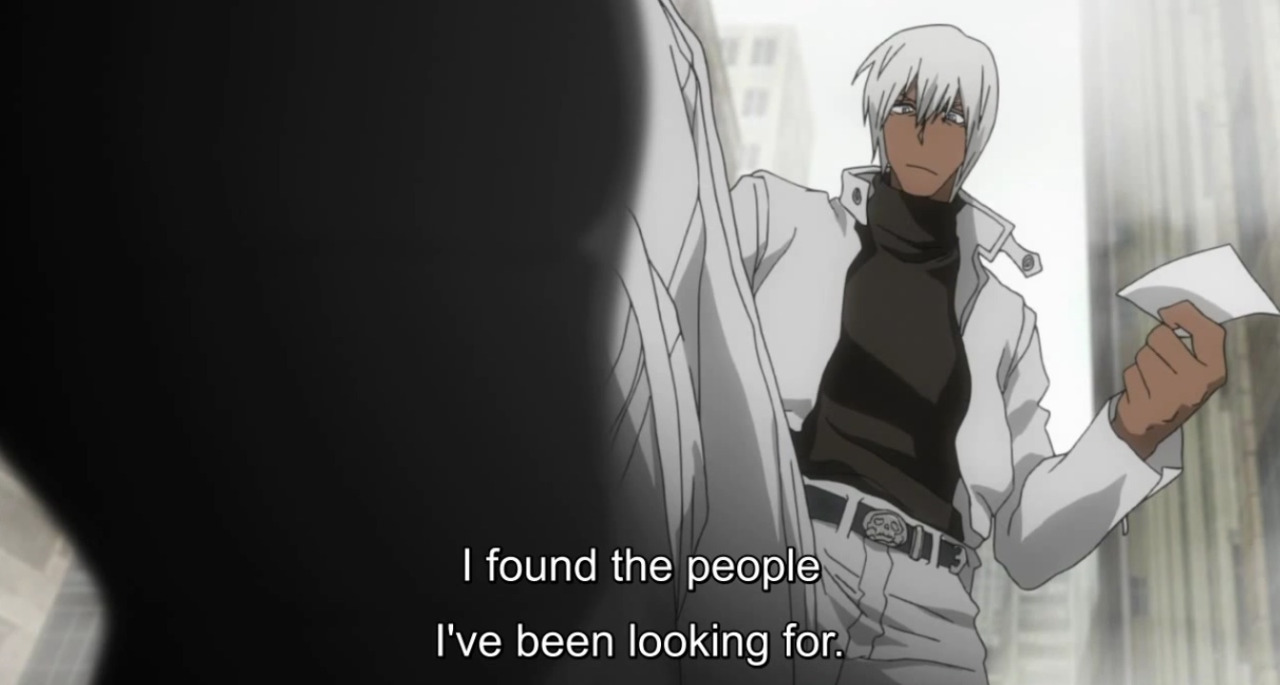
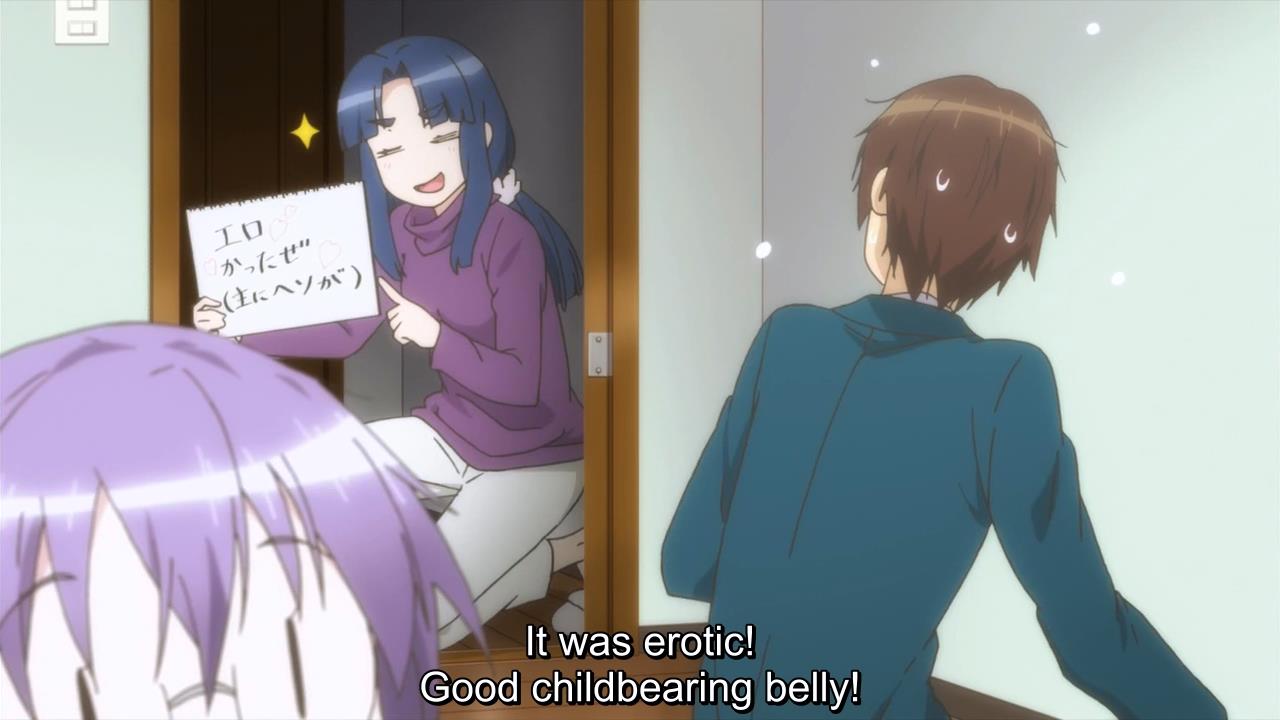

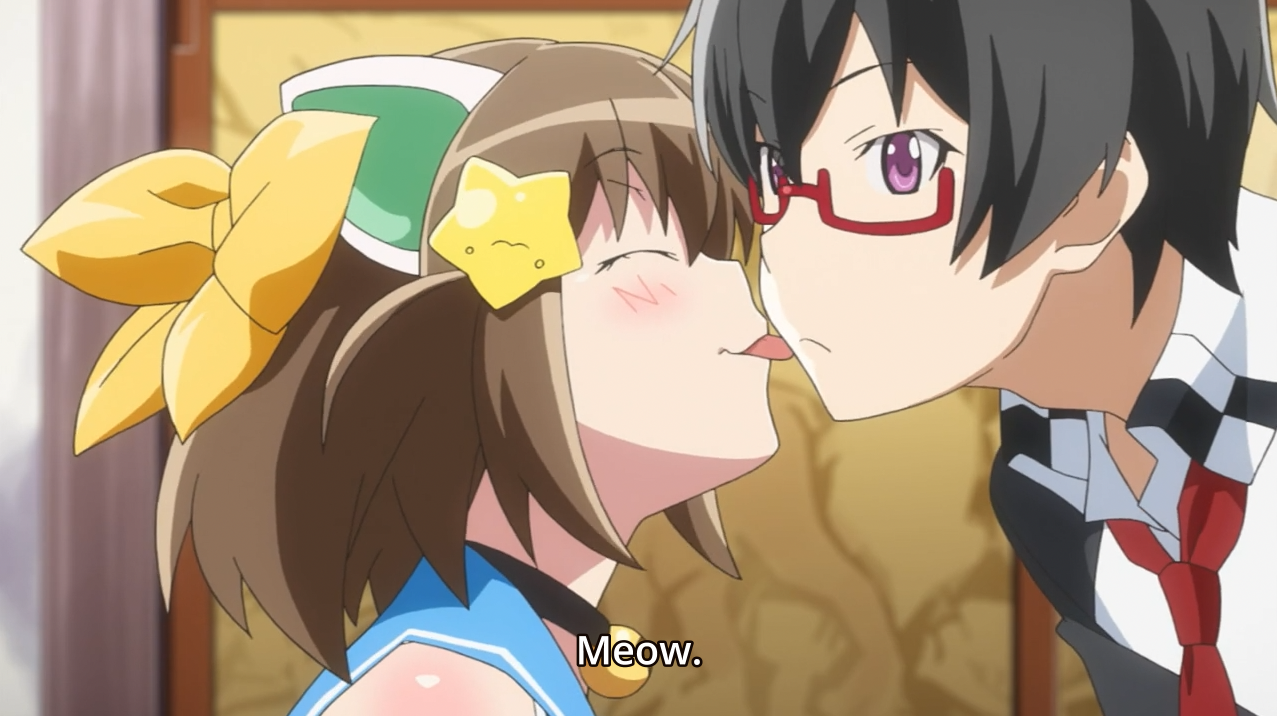
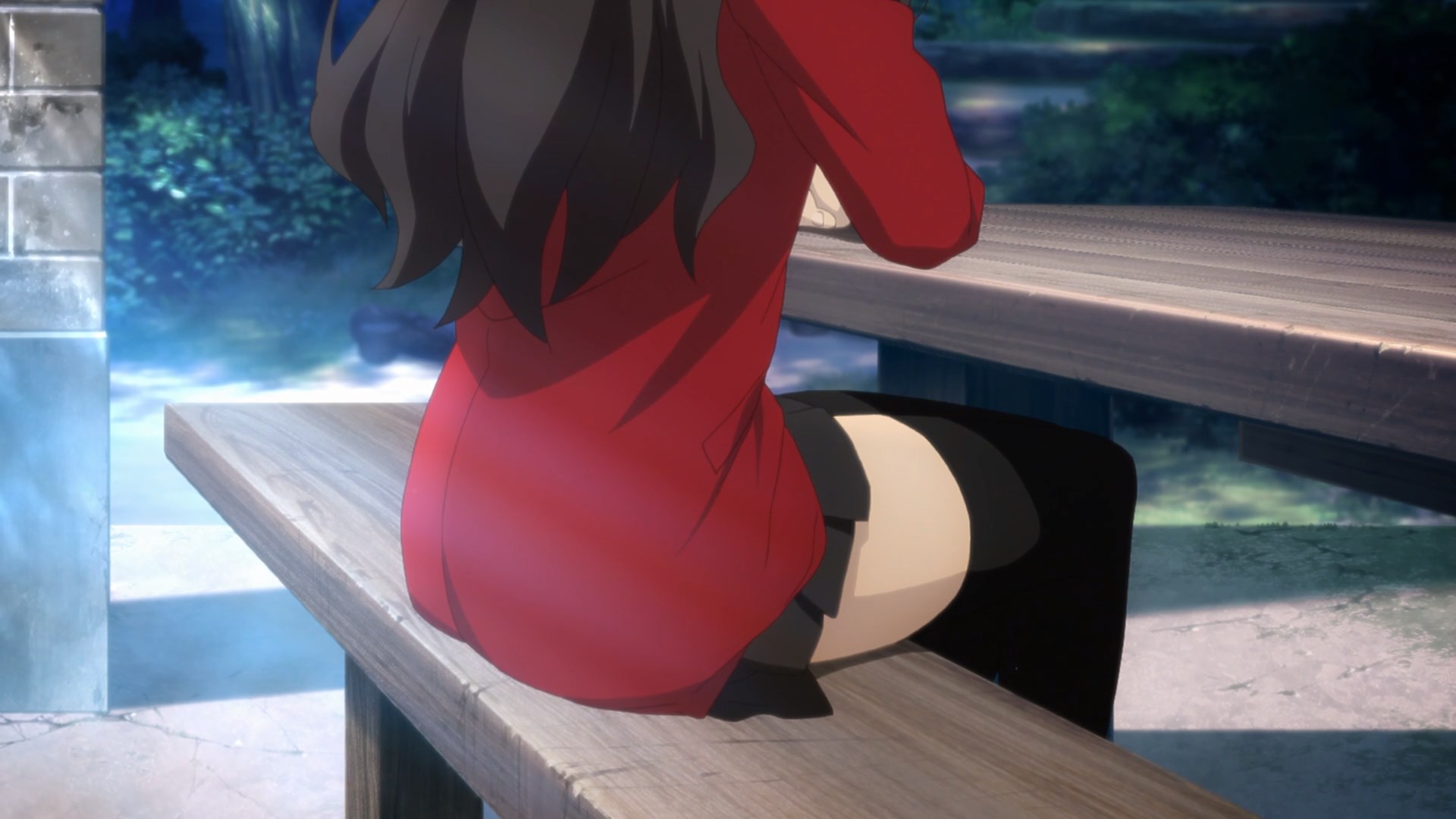
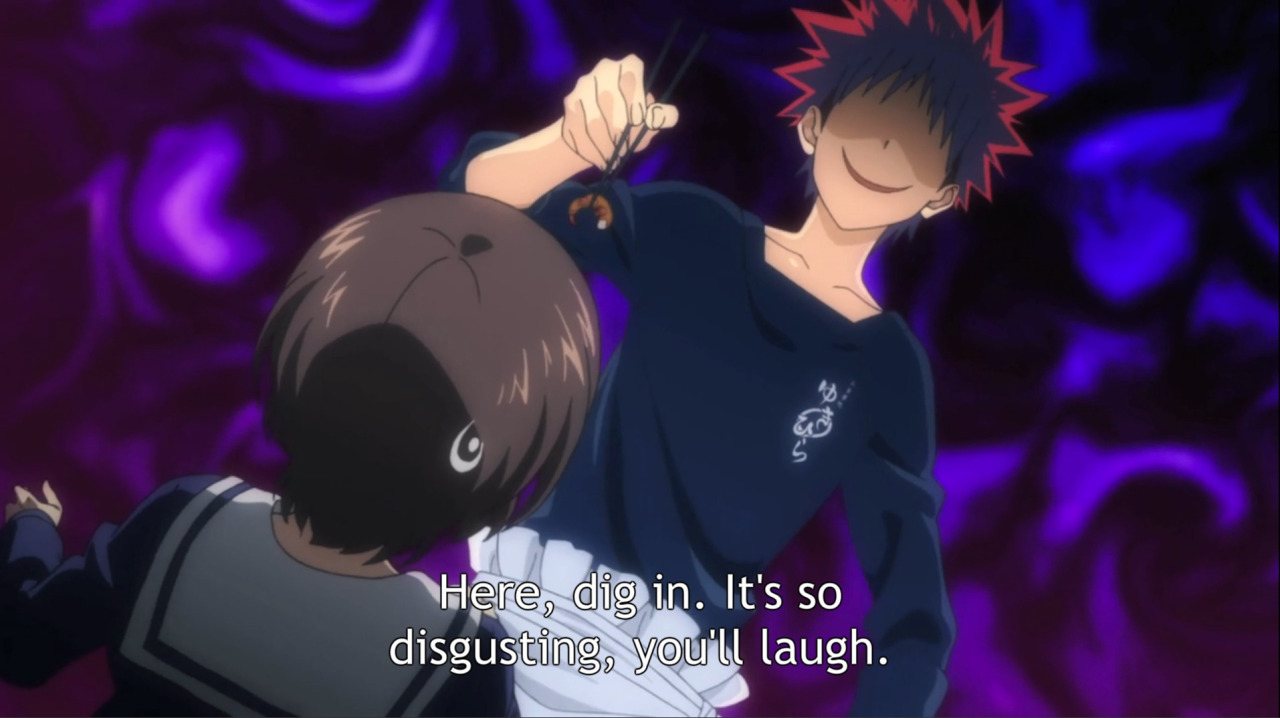
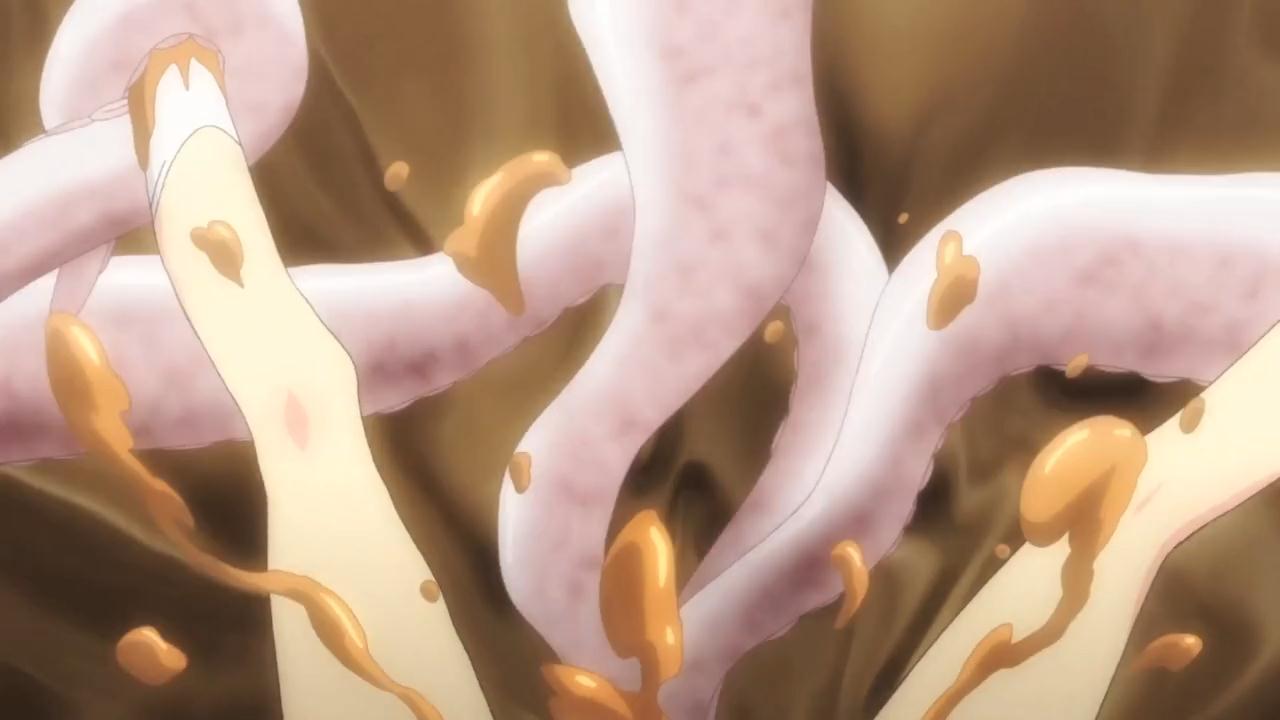
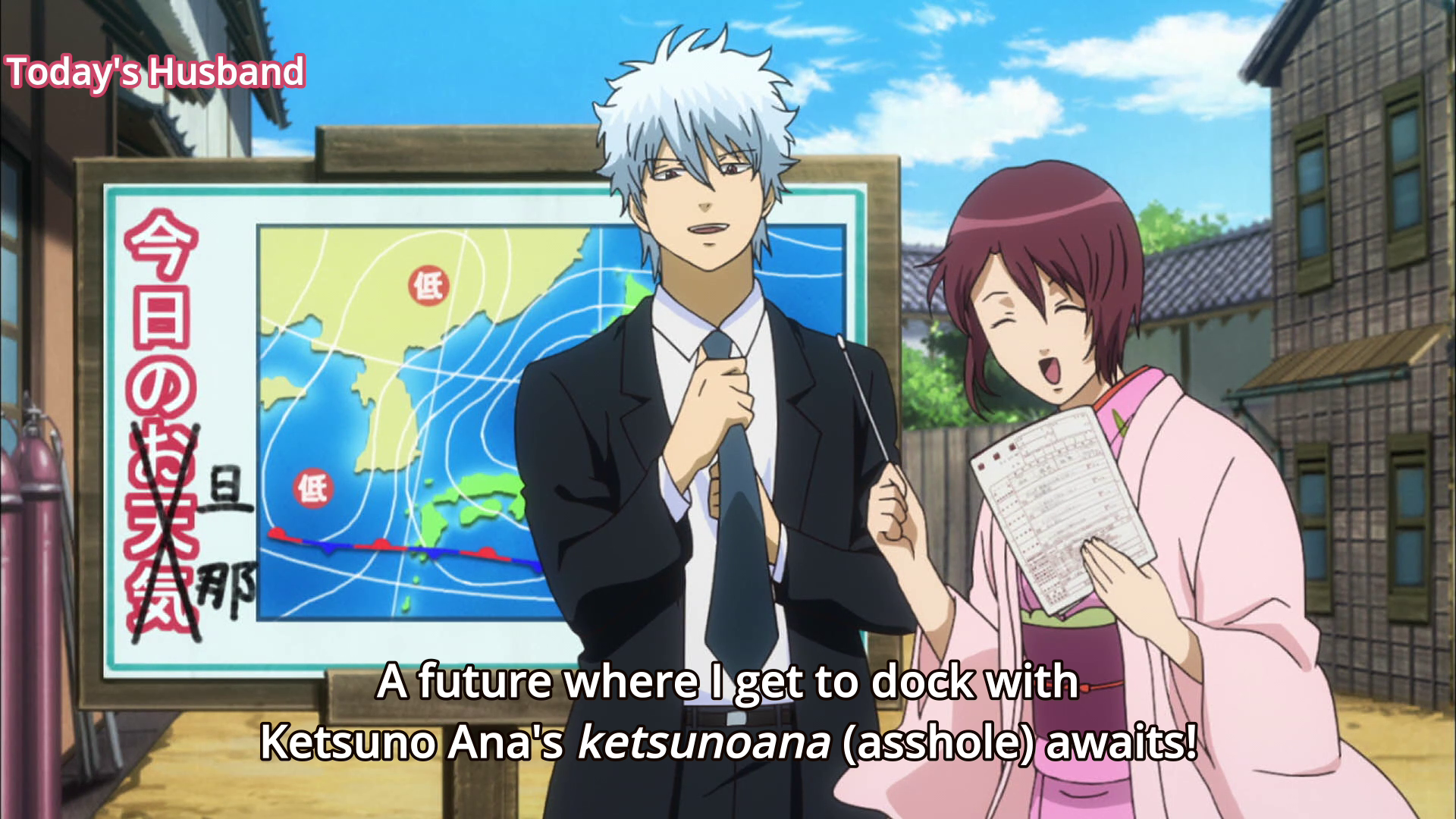
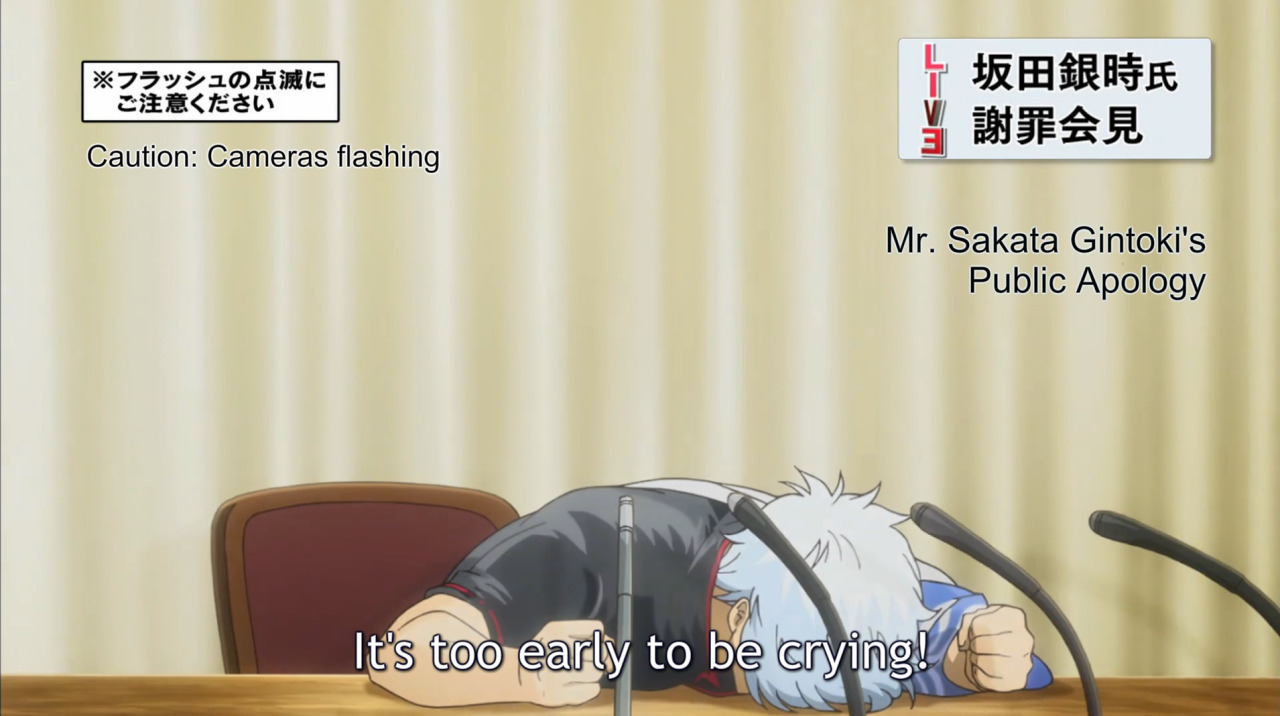
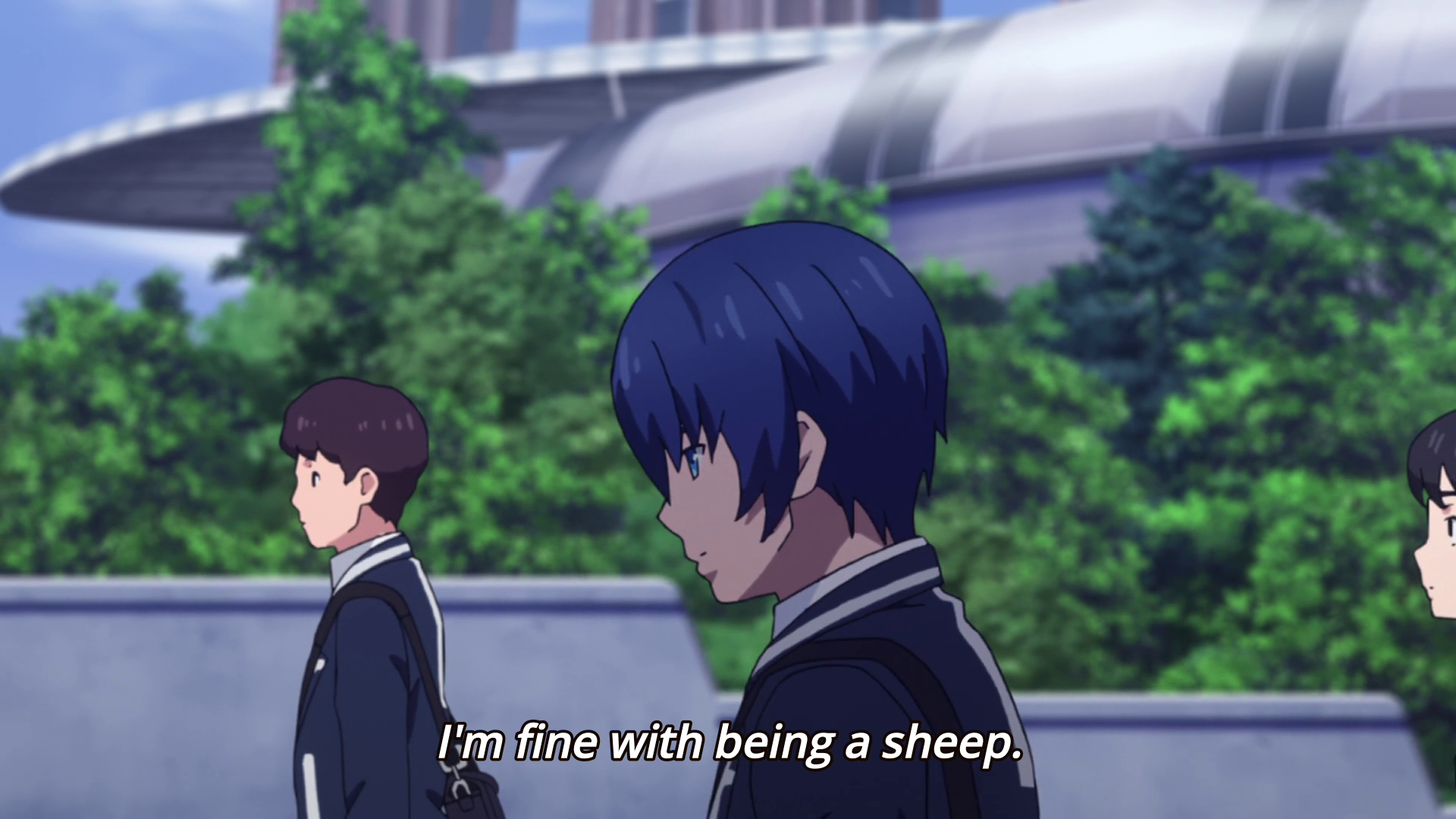
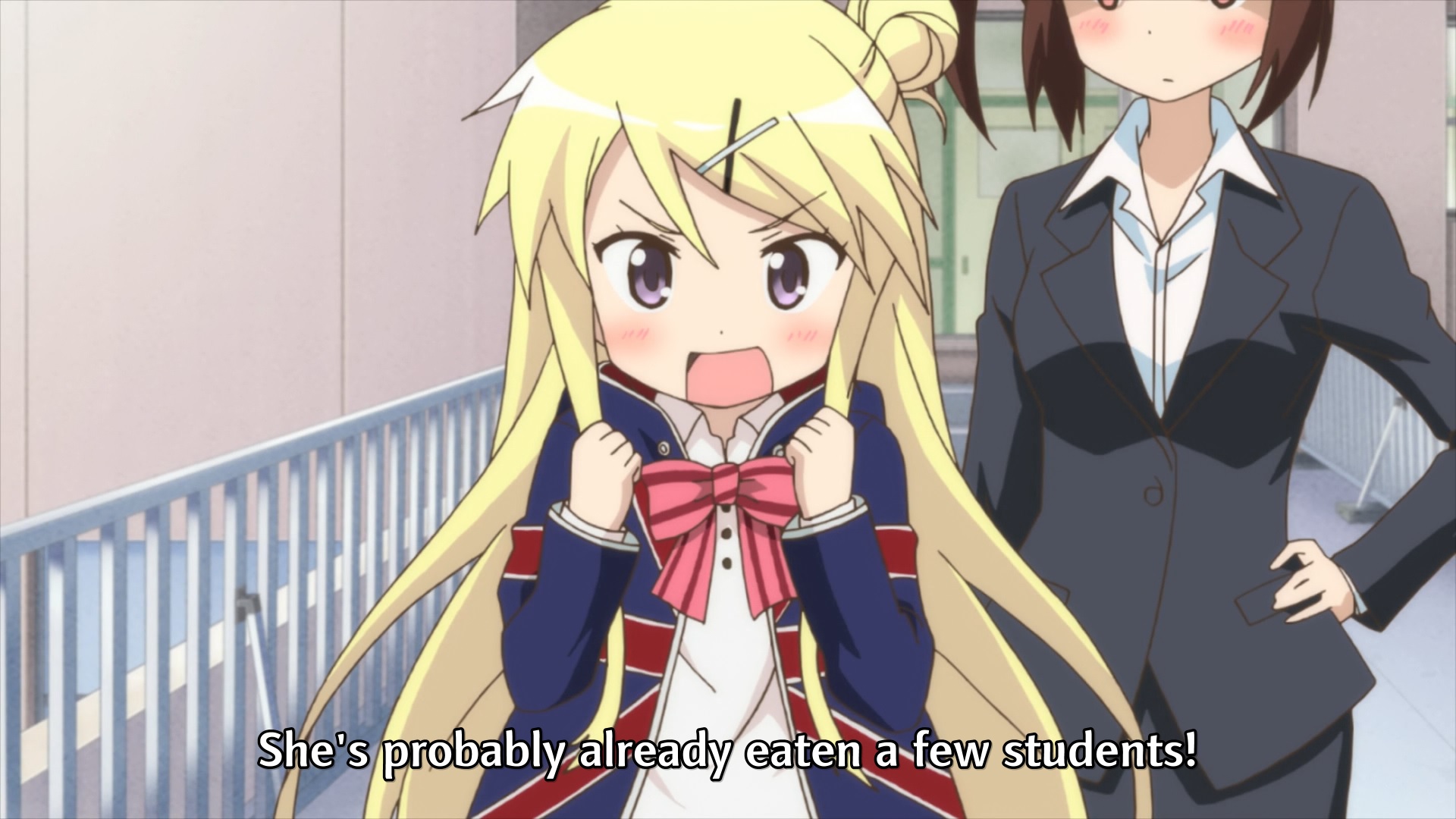
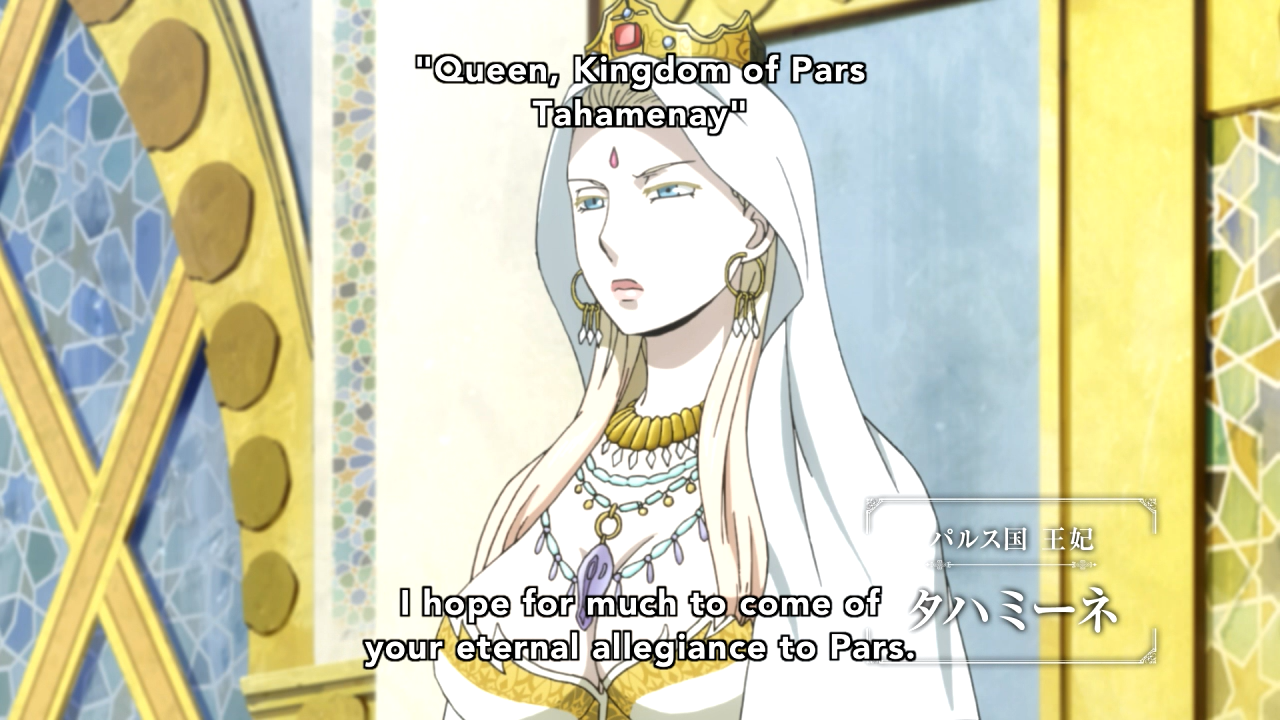
![[Star Wars meme quote]](http://animationrevelation.com/readables/wp-content/uploads/2015/04/ArsimatedGIF.gif)
